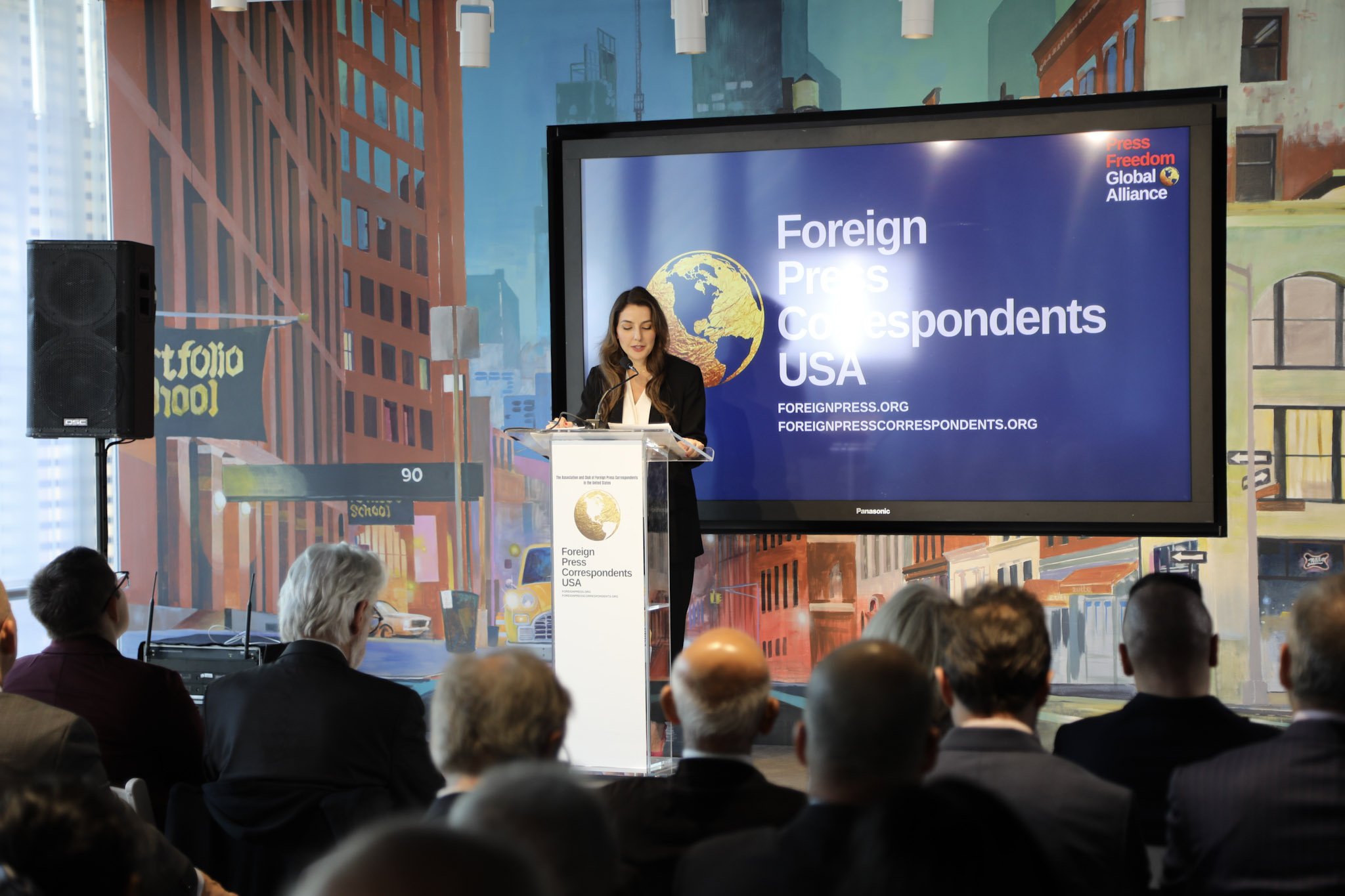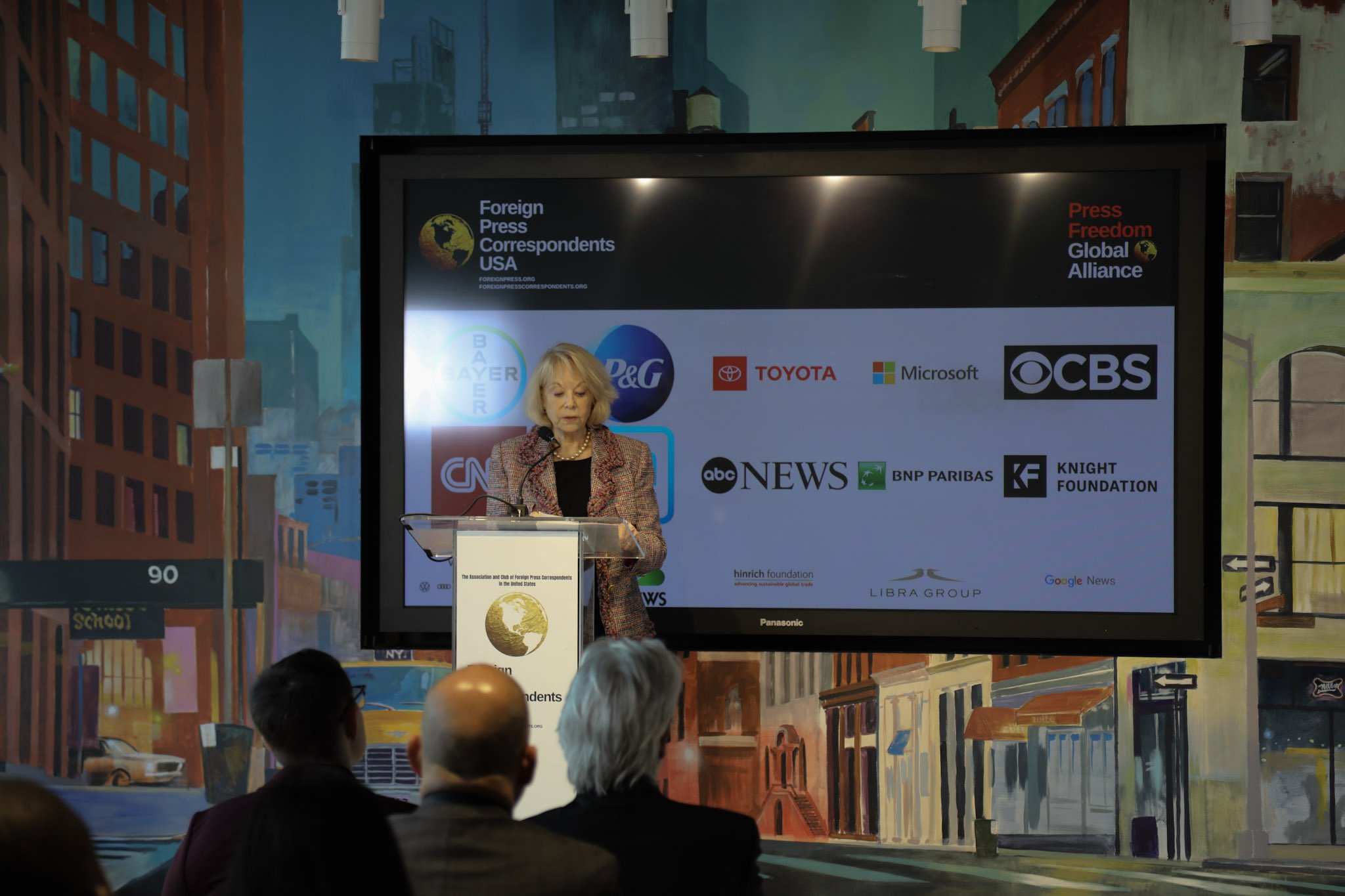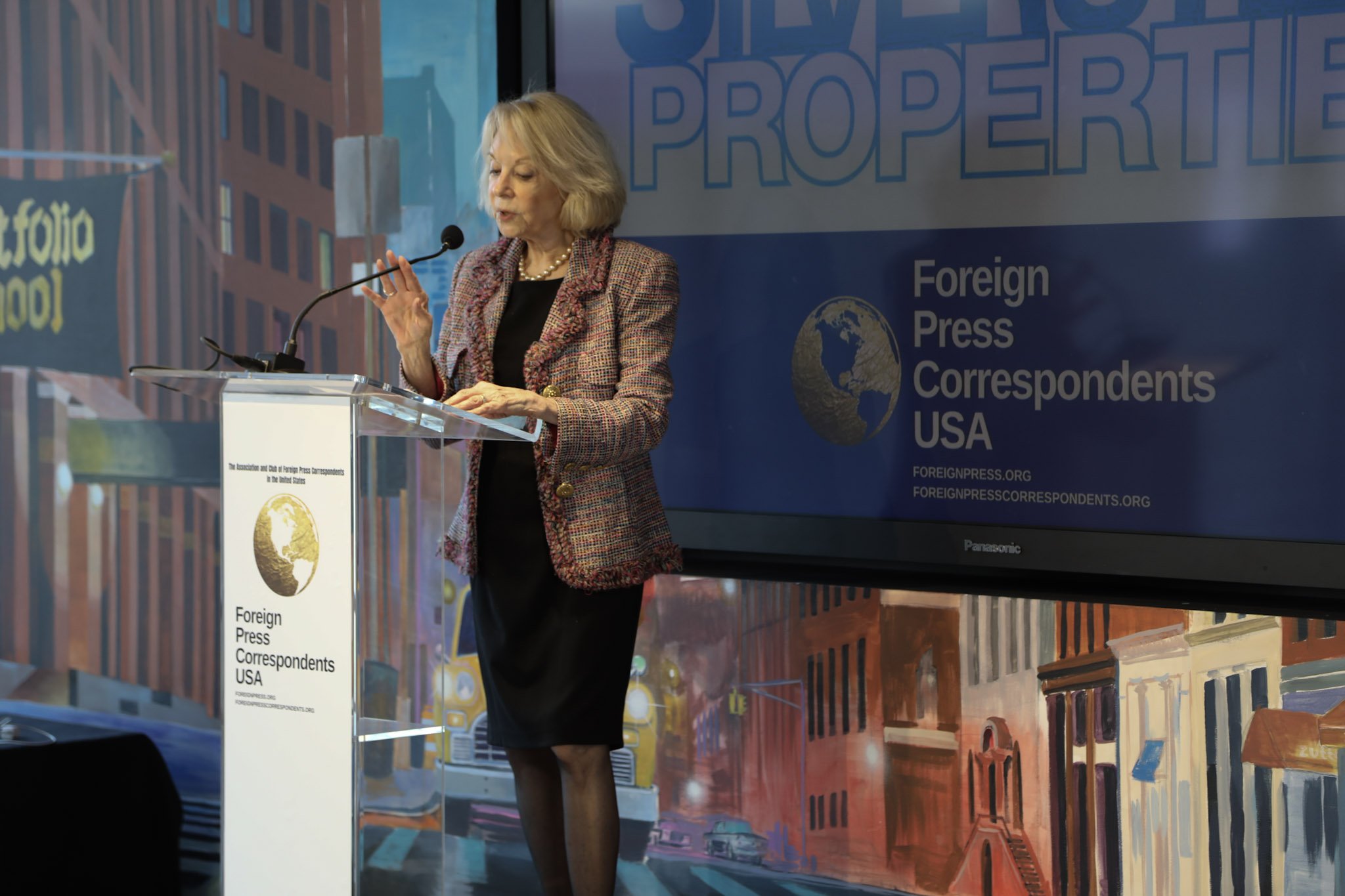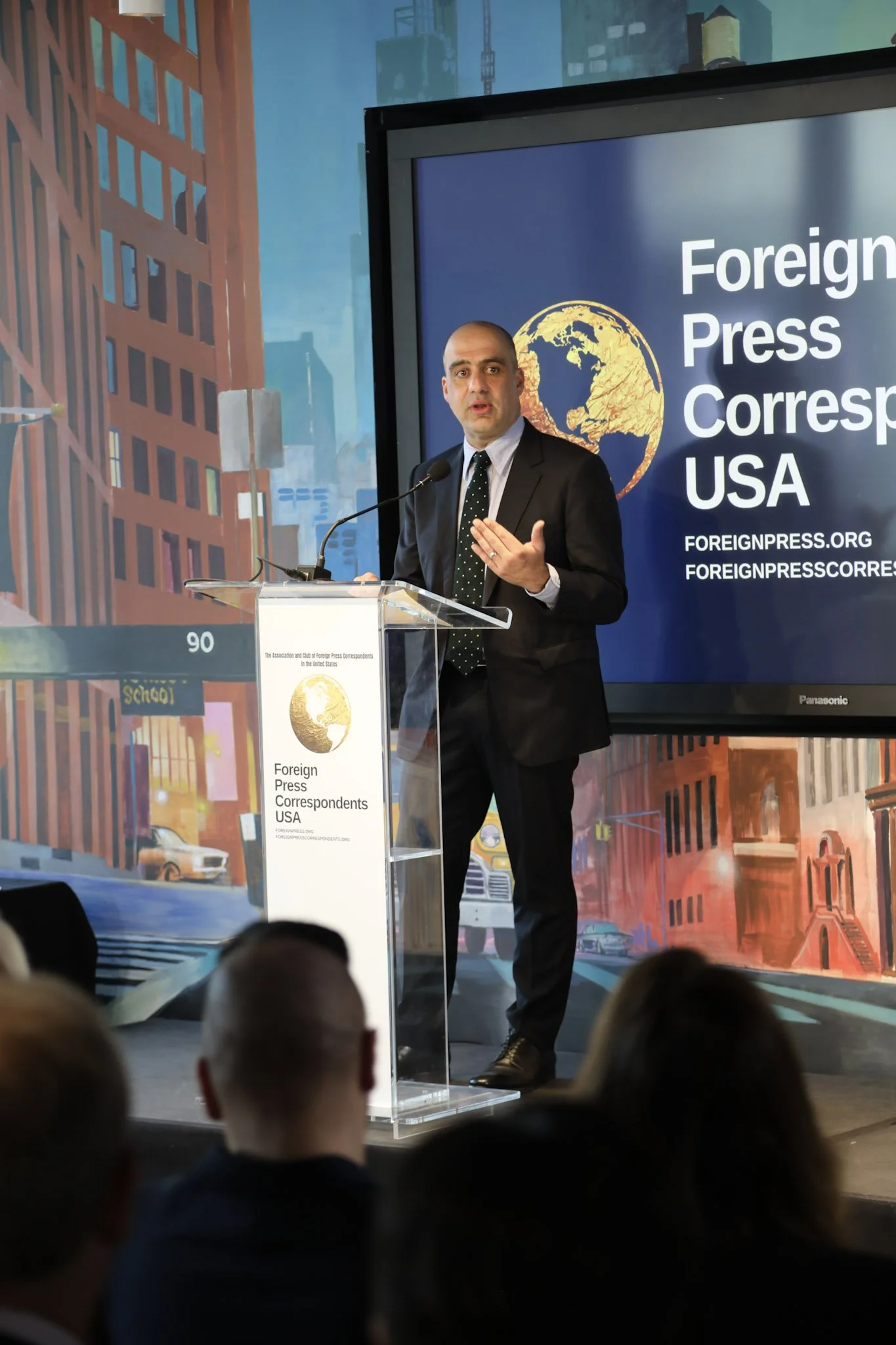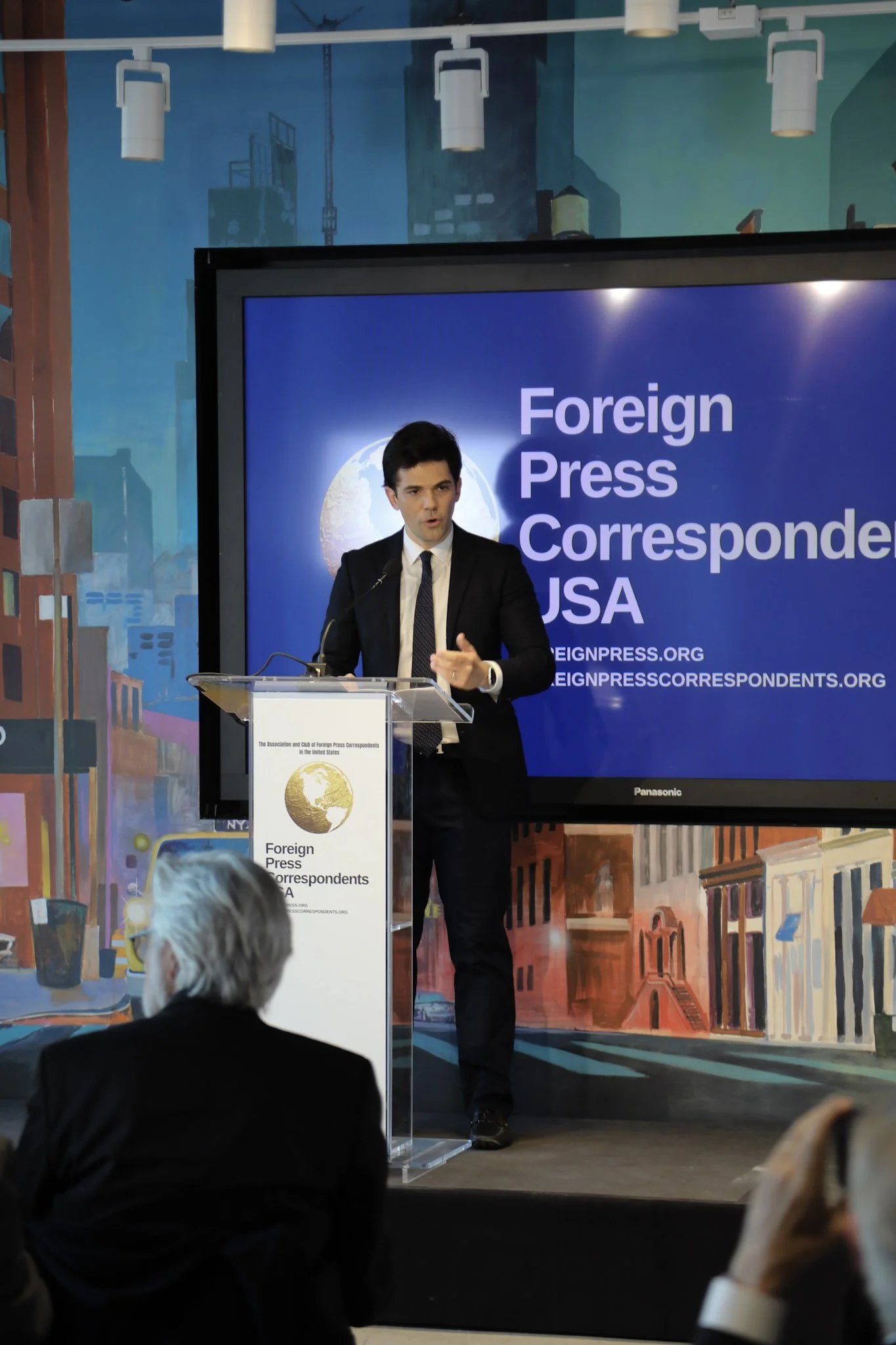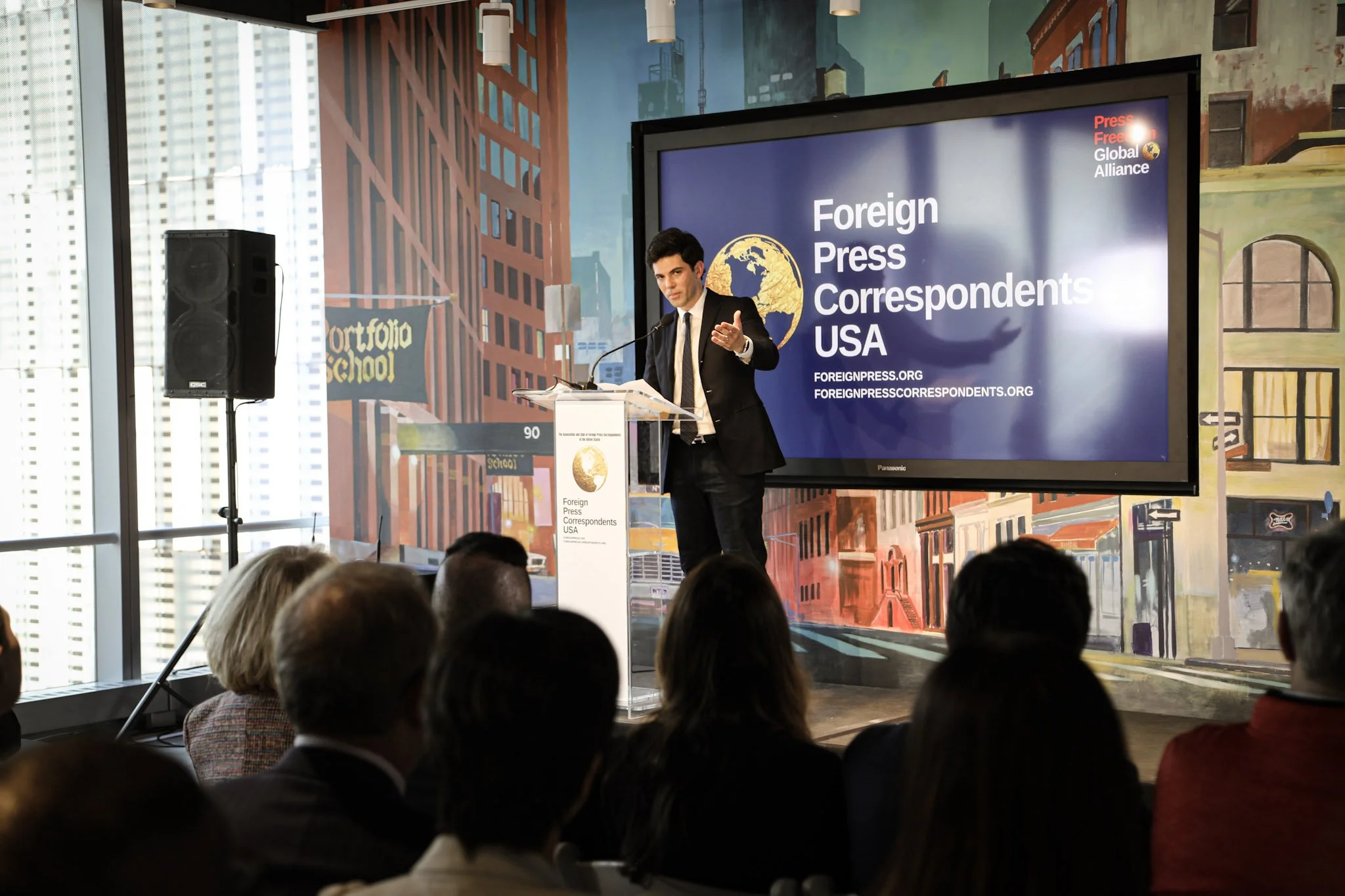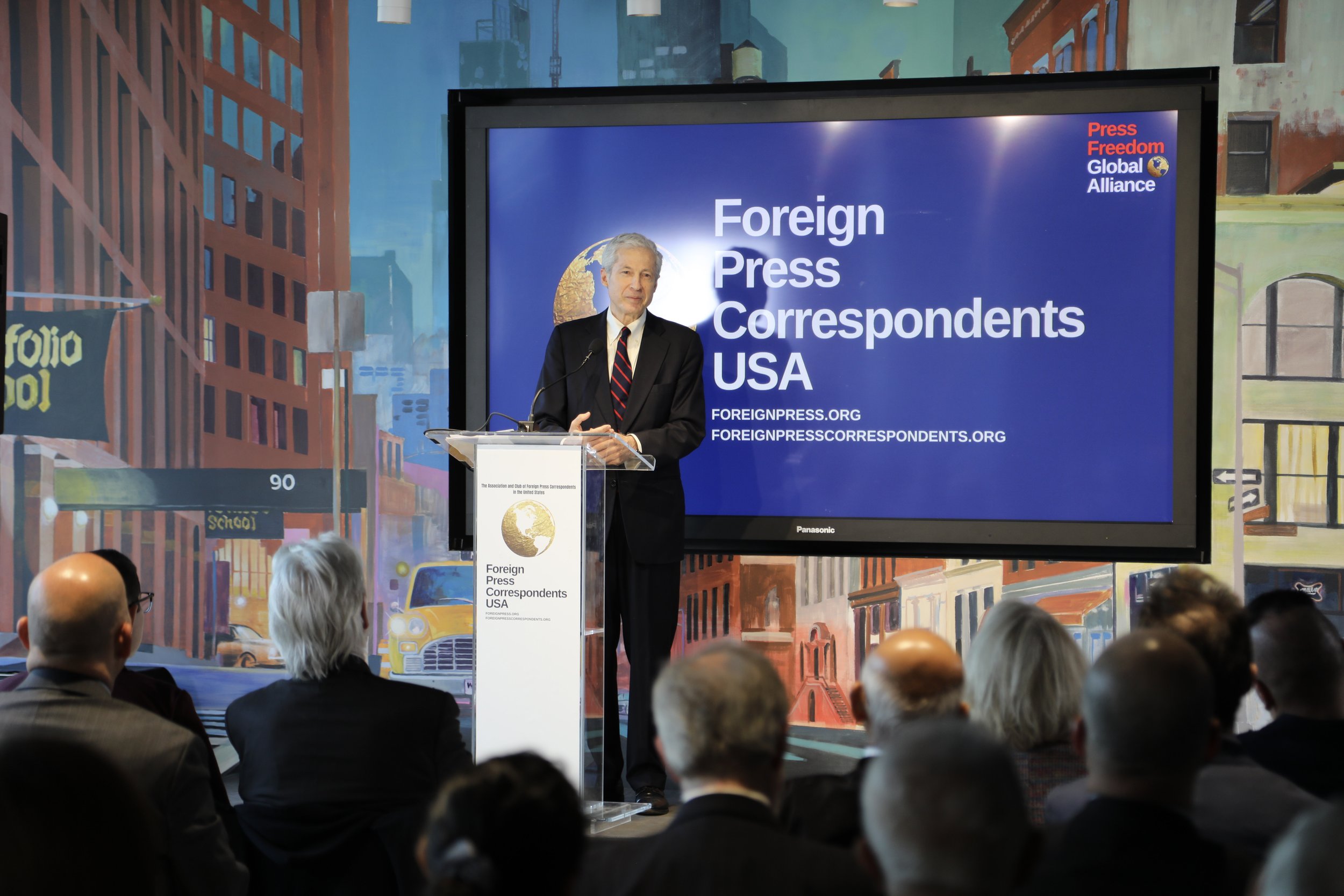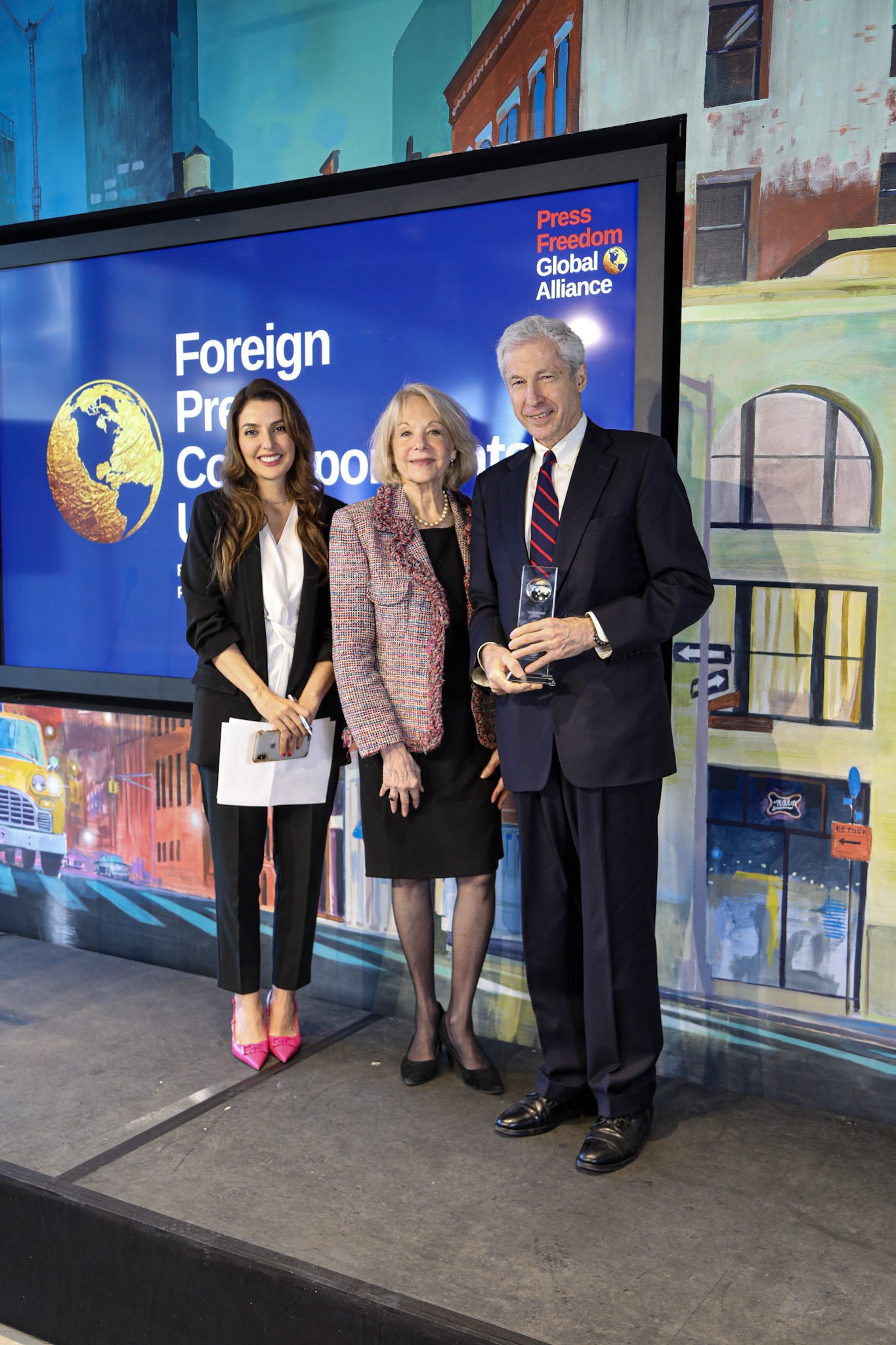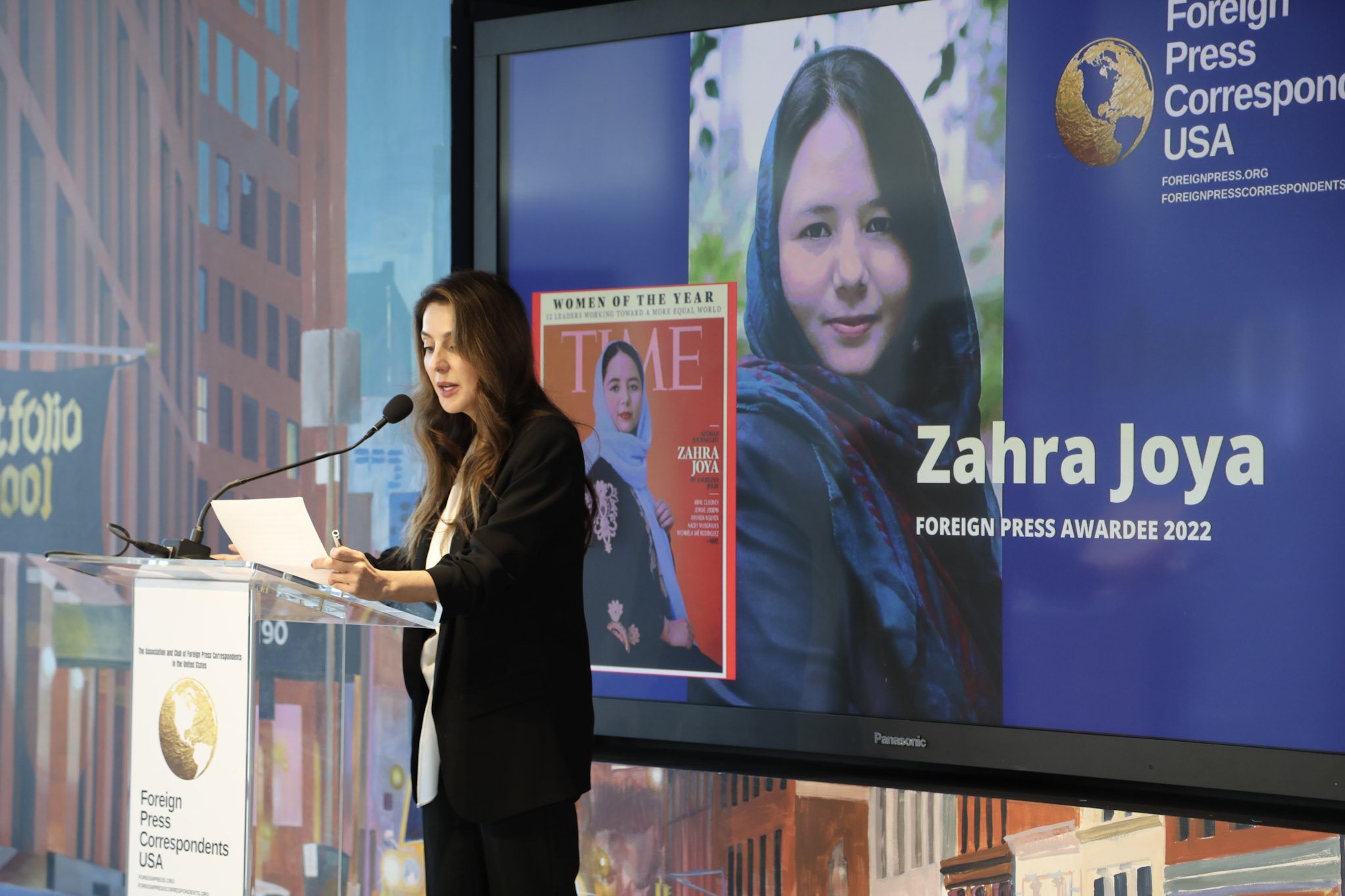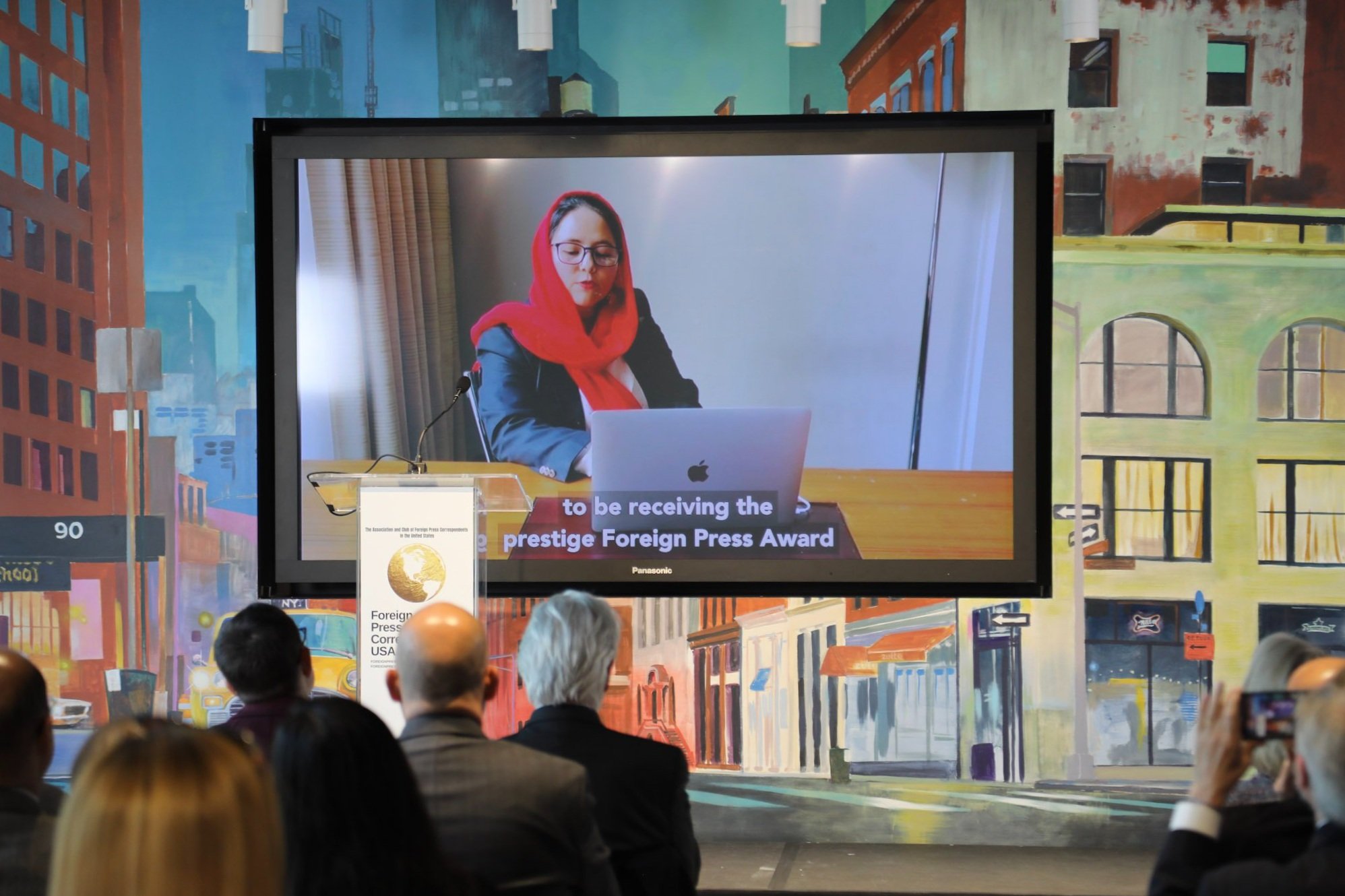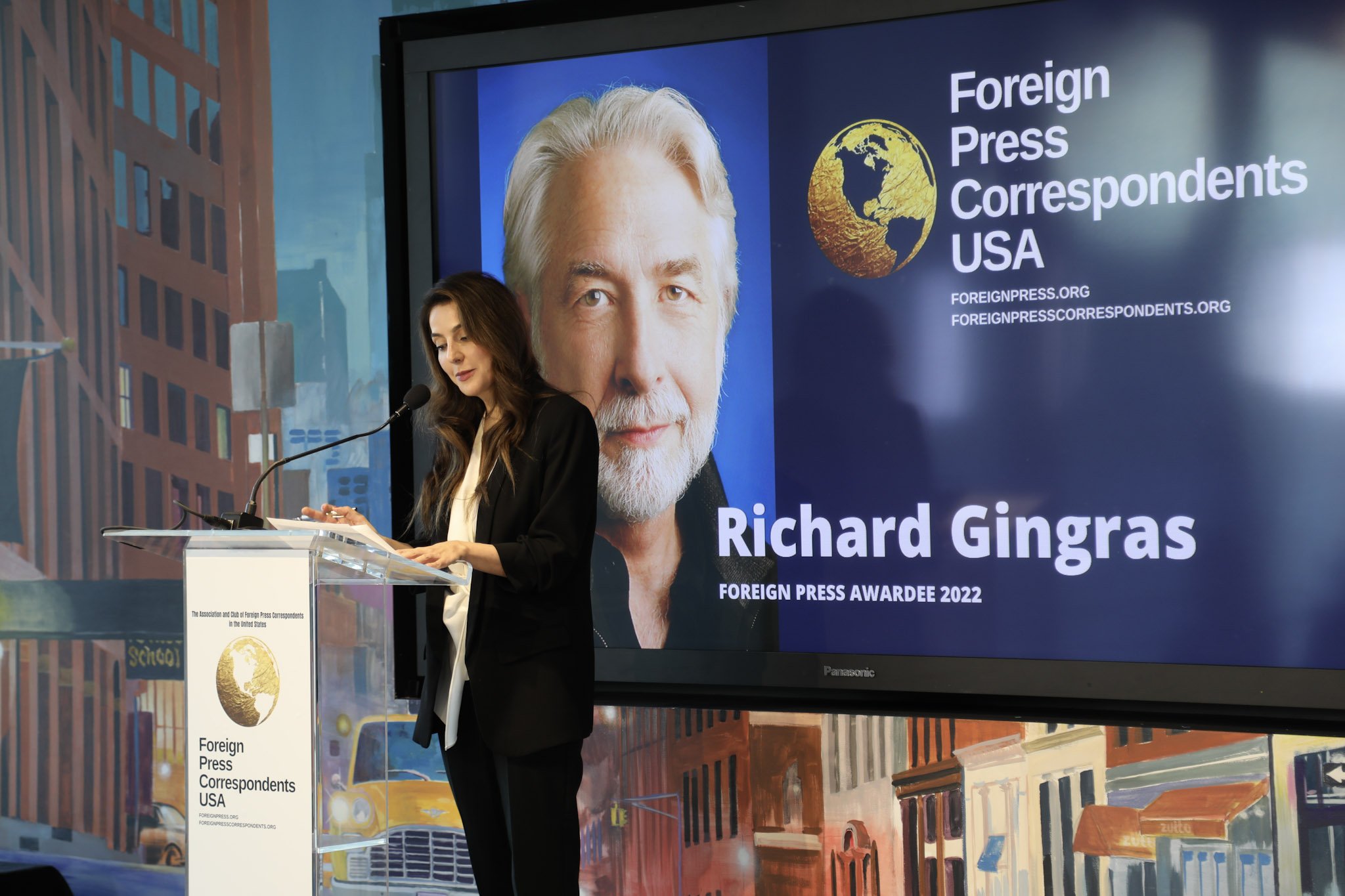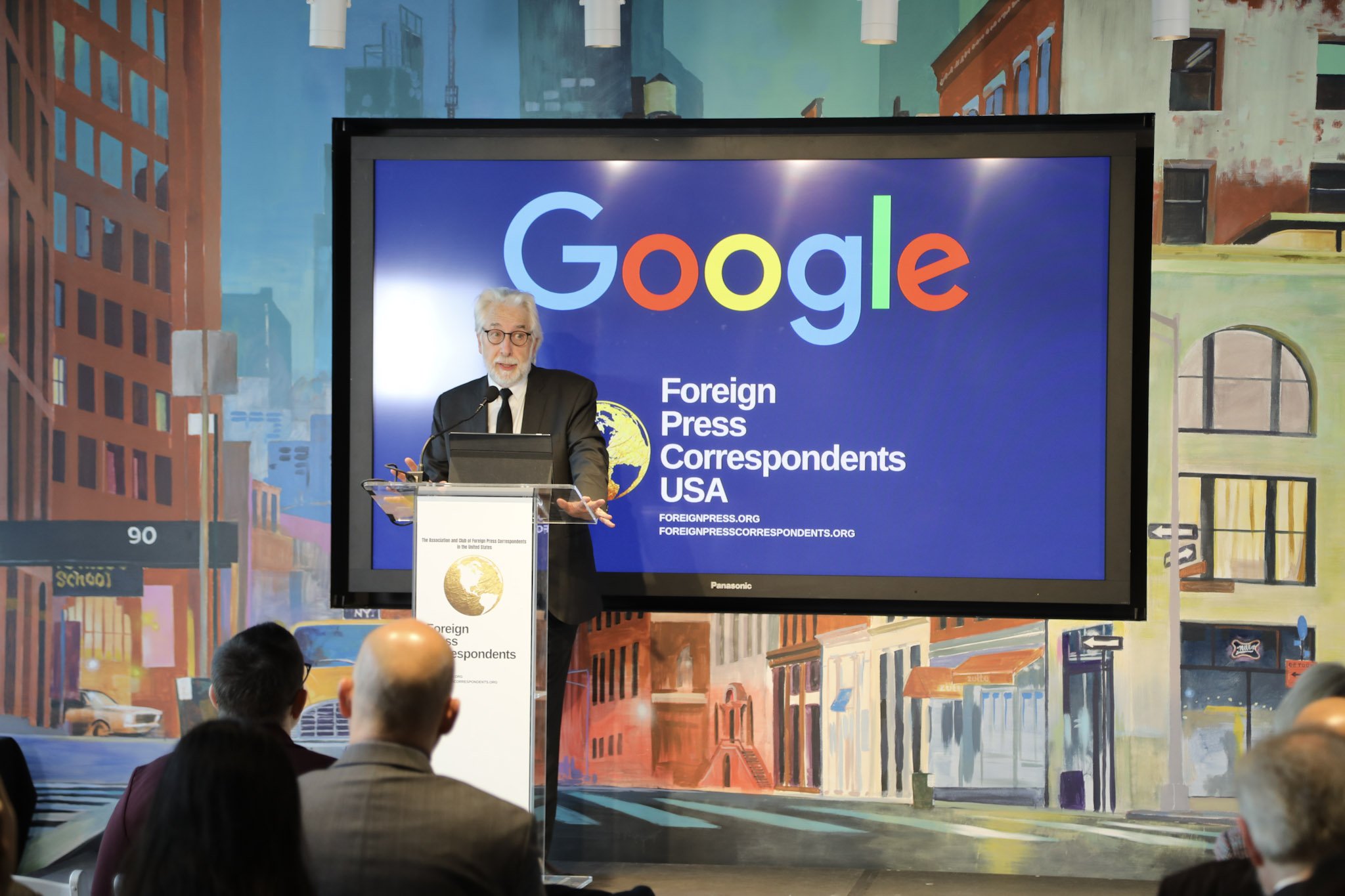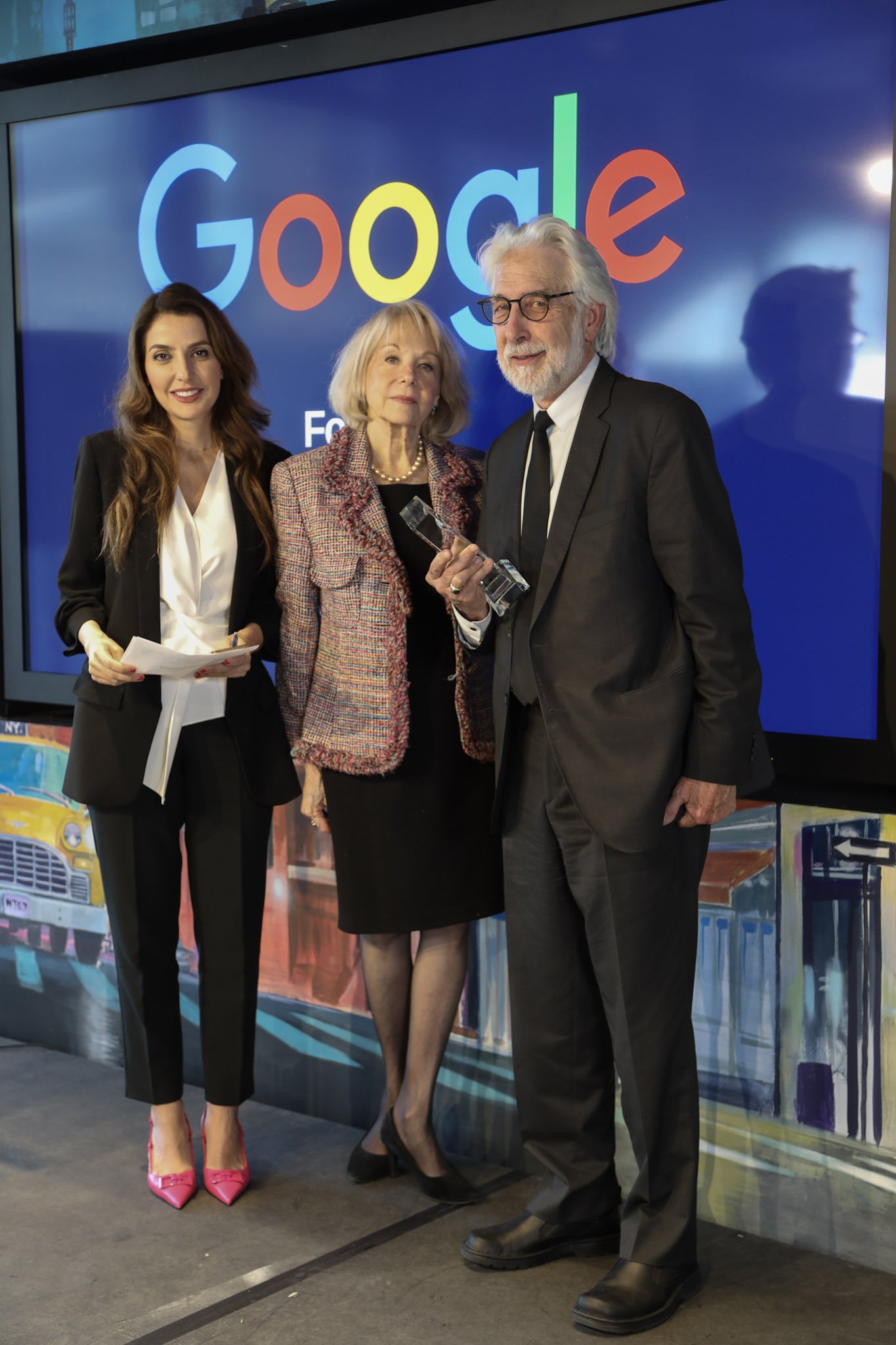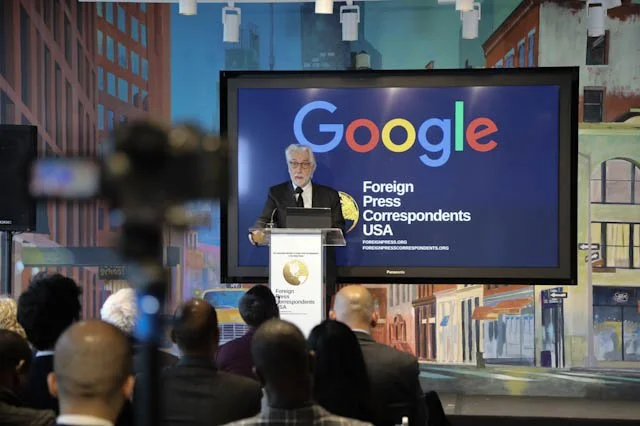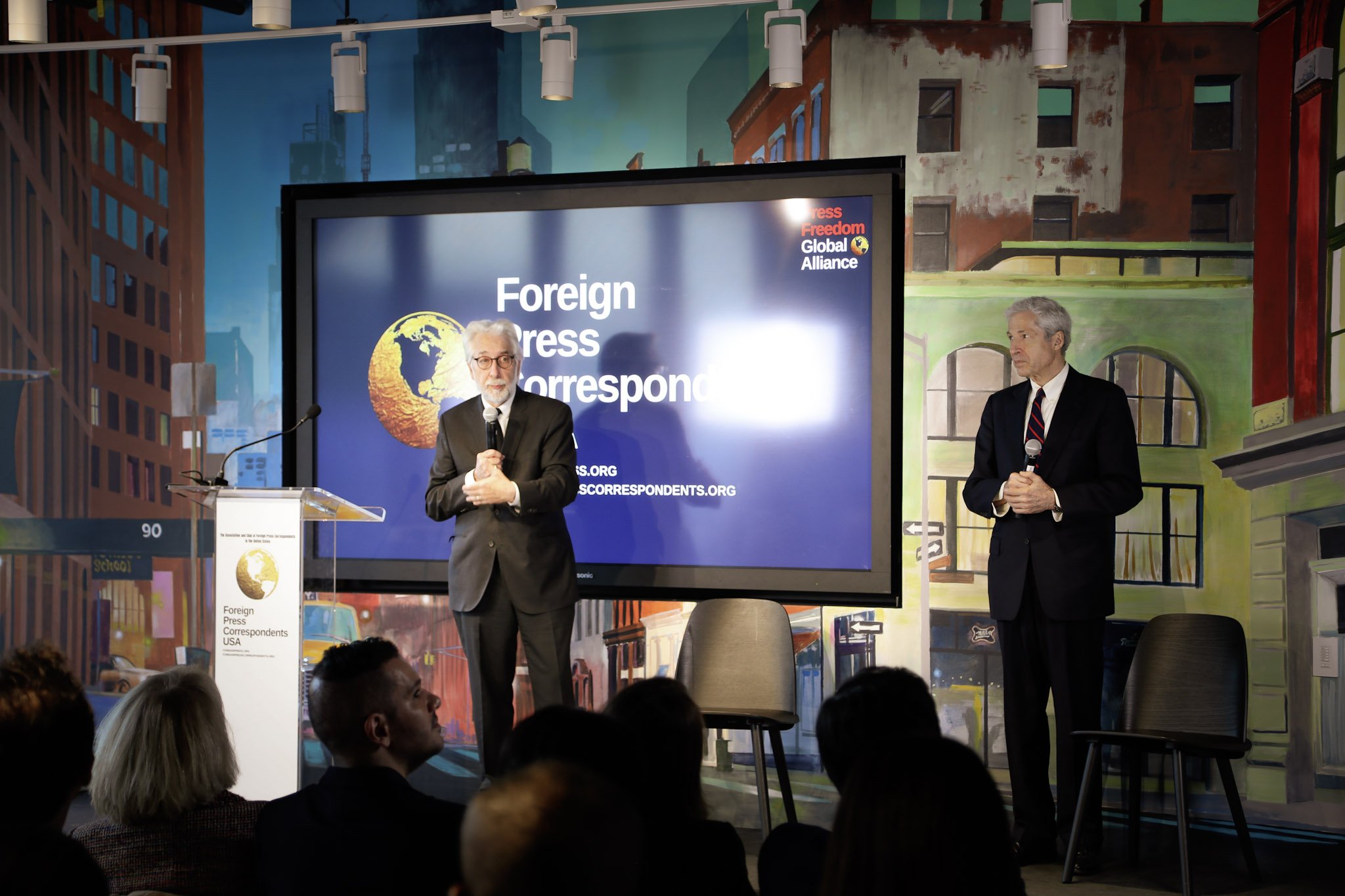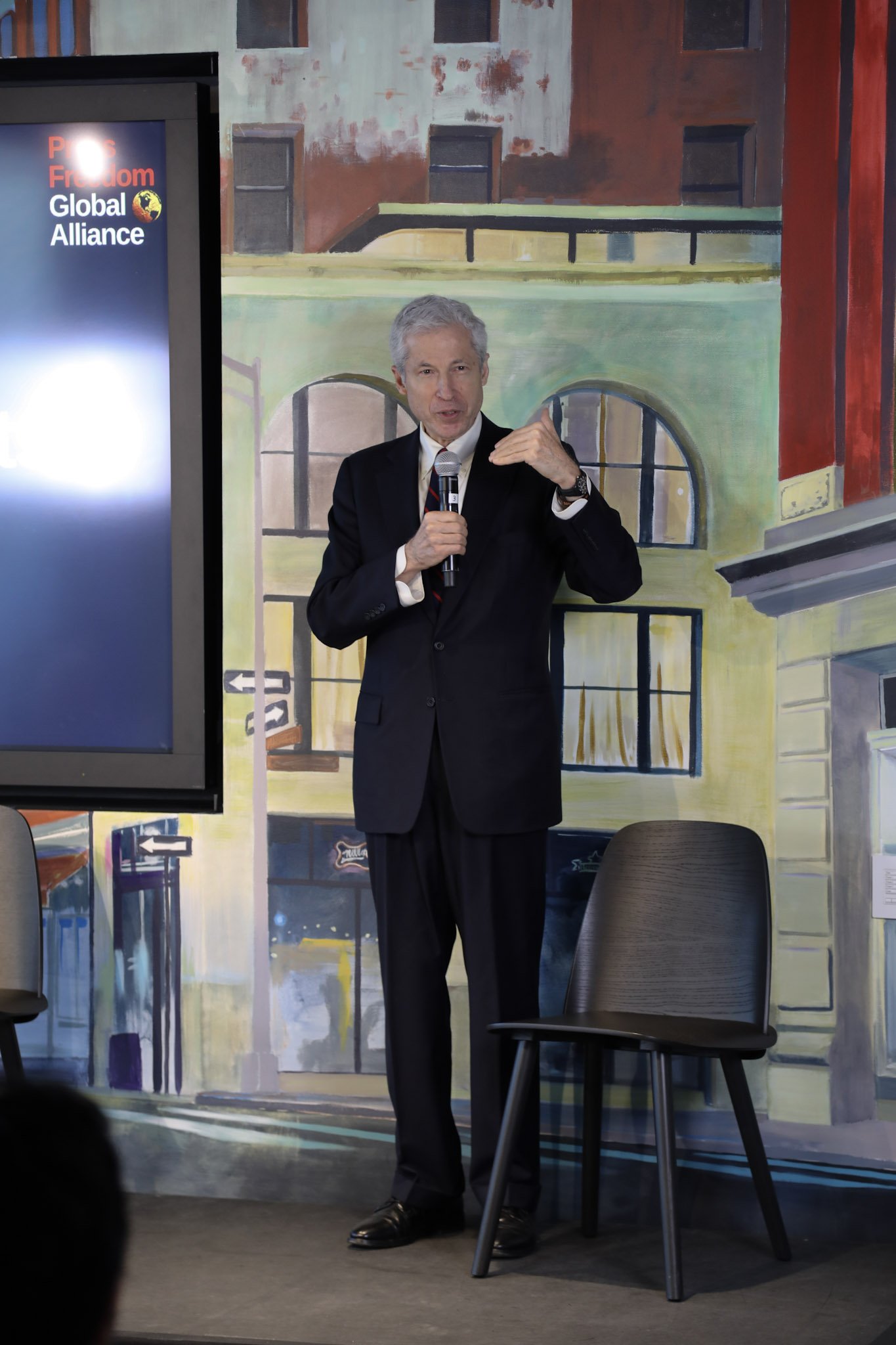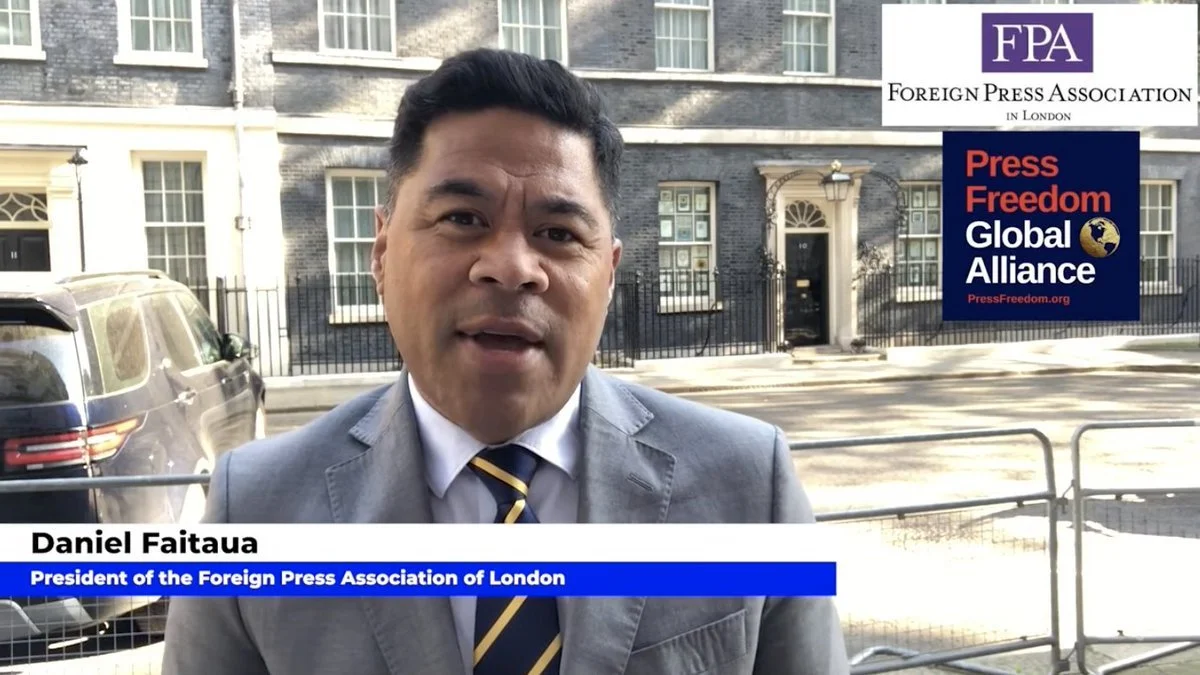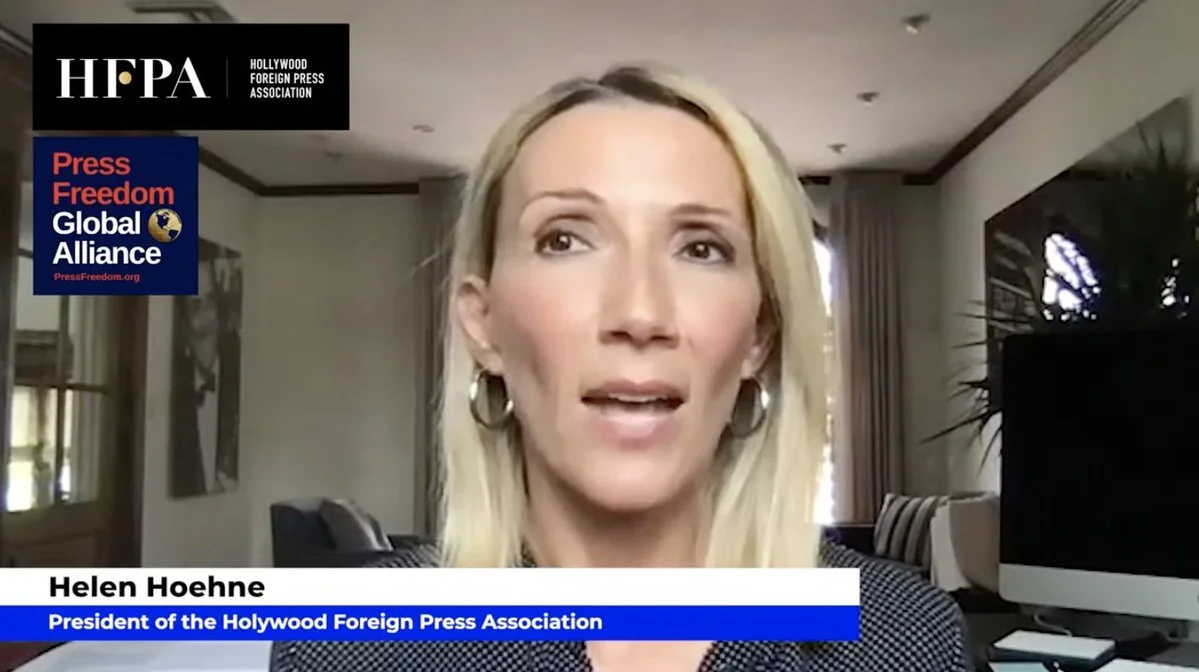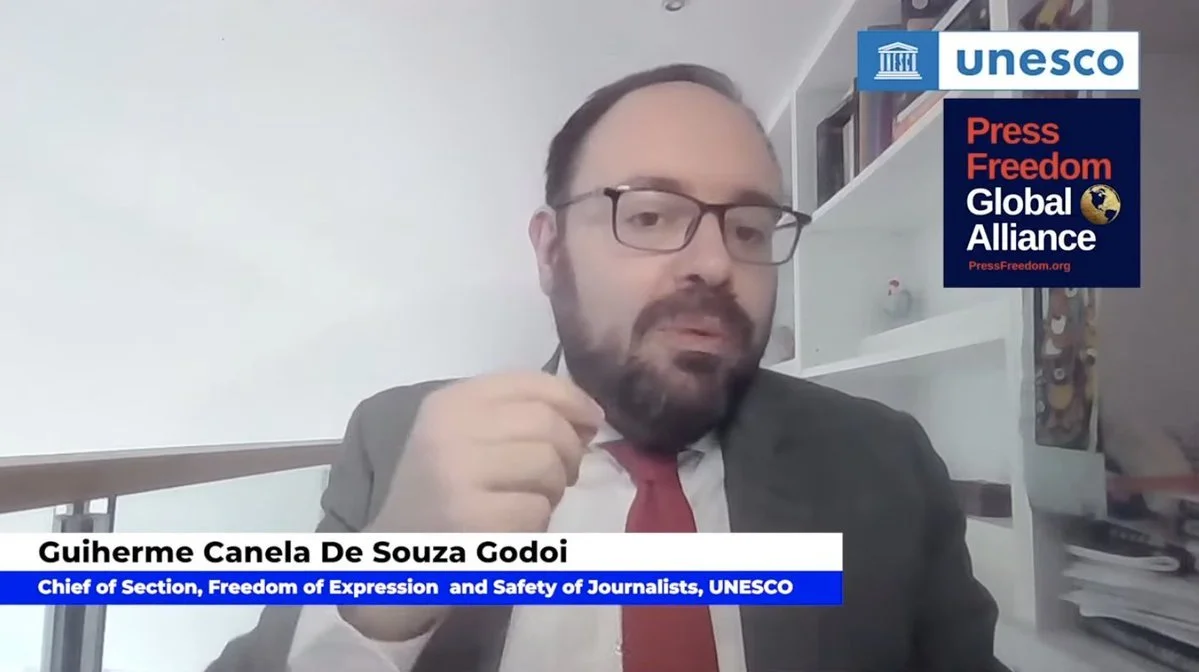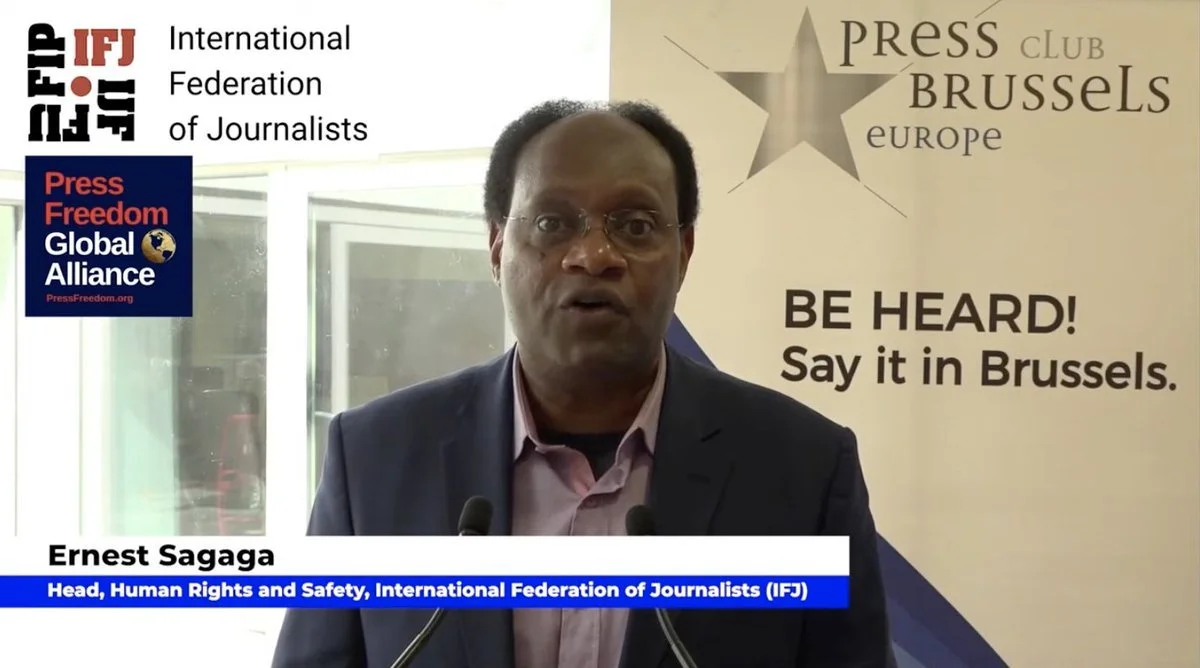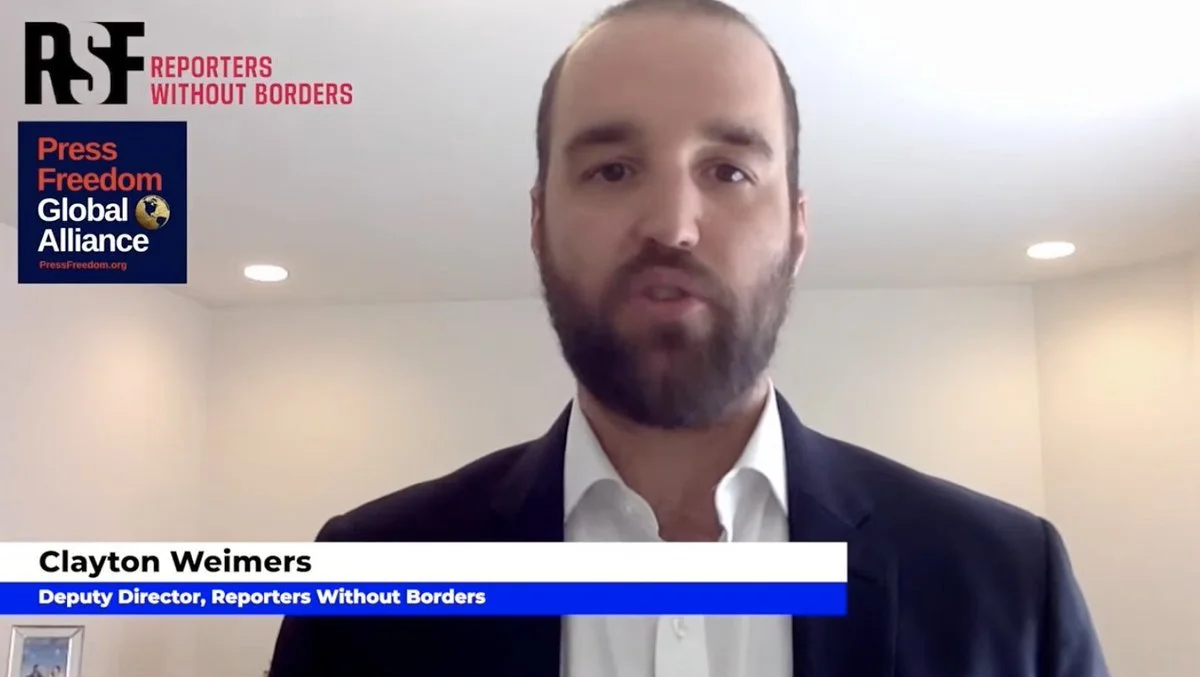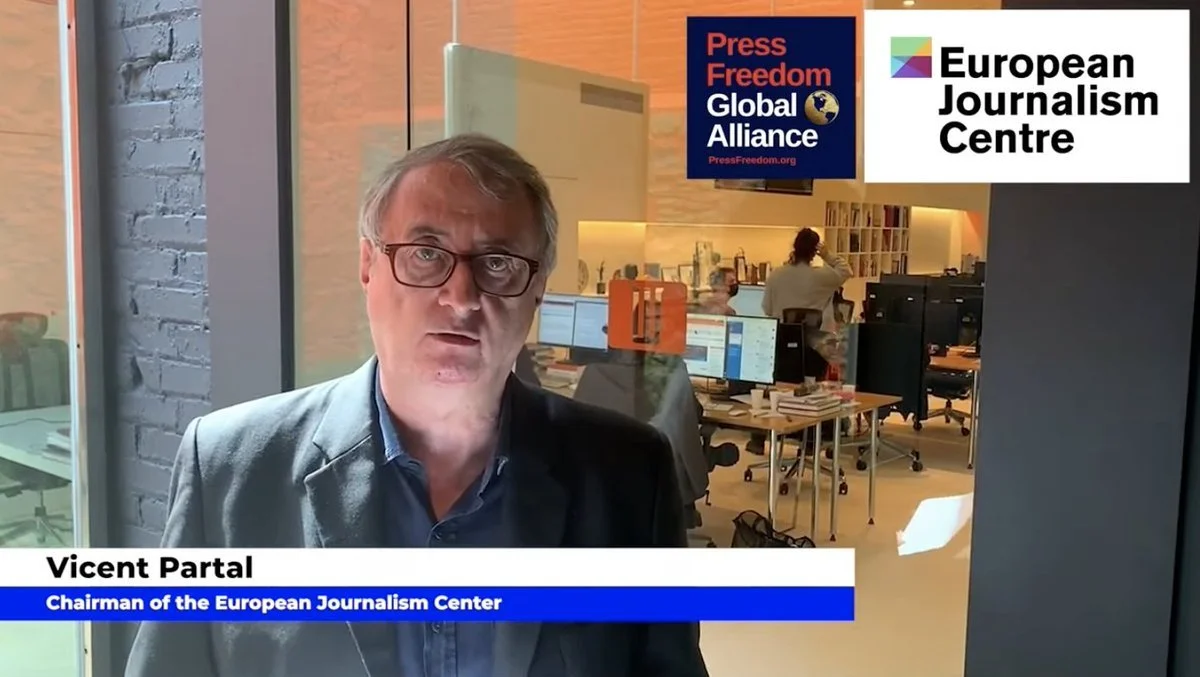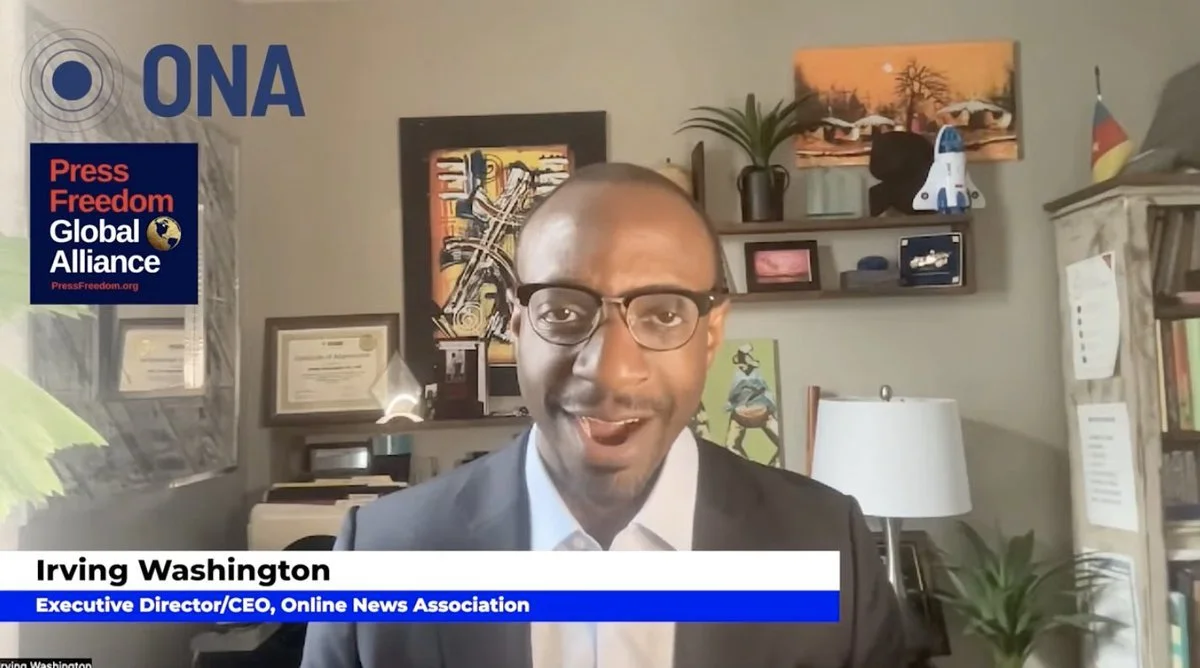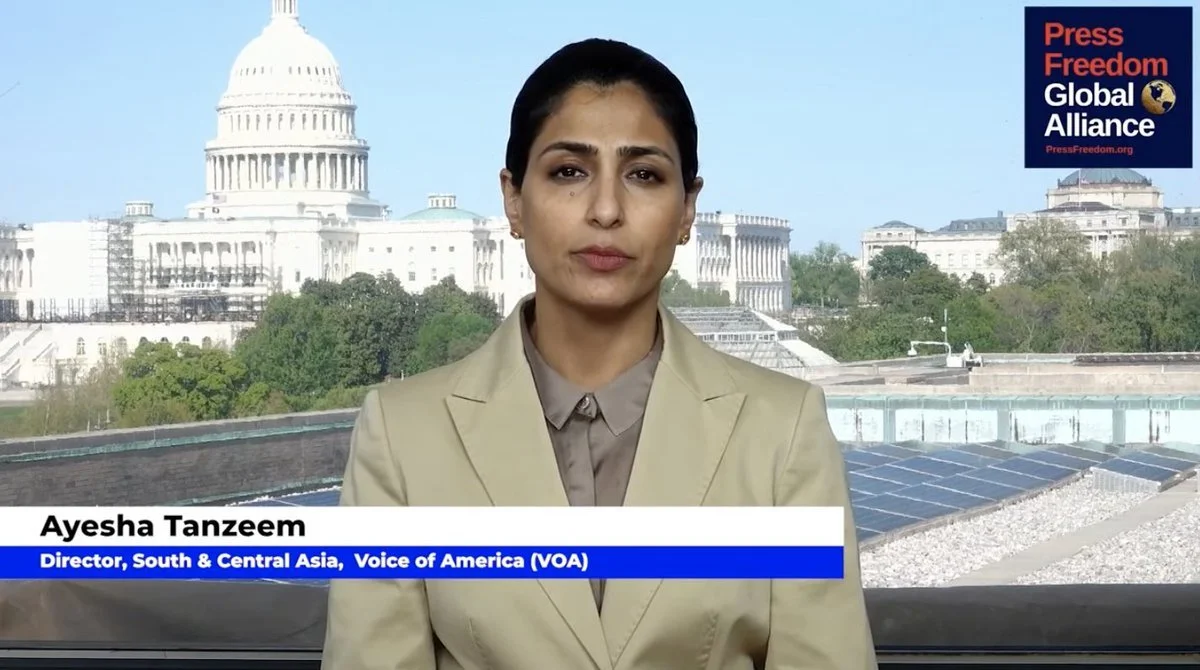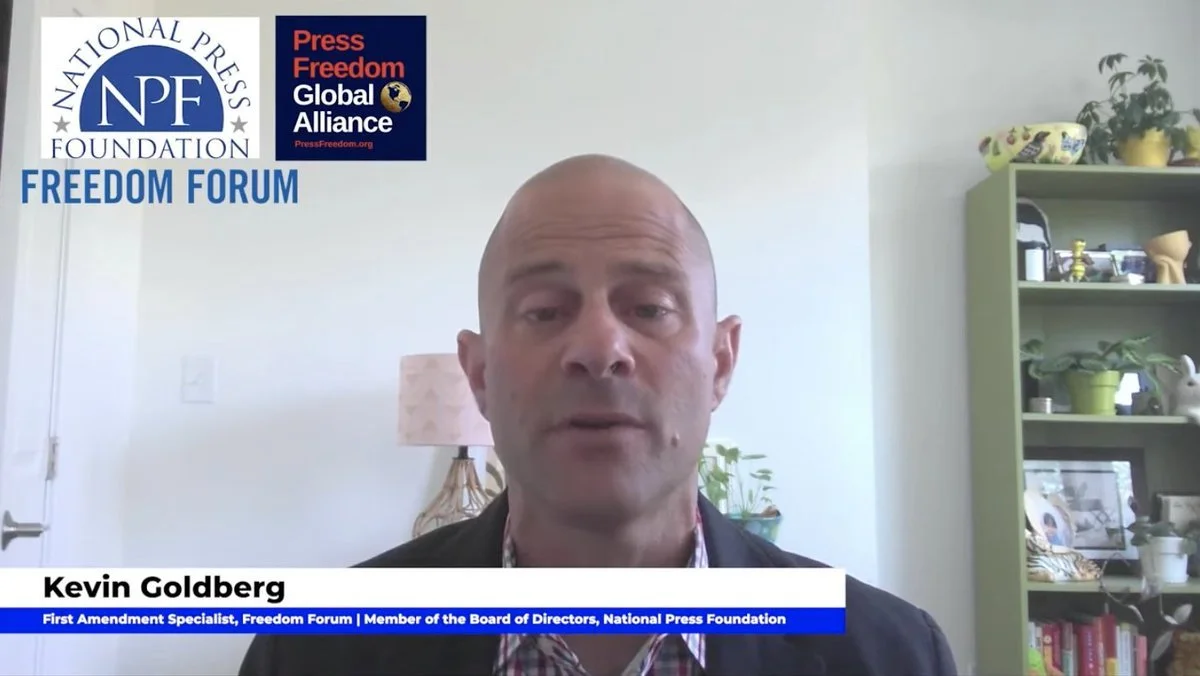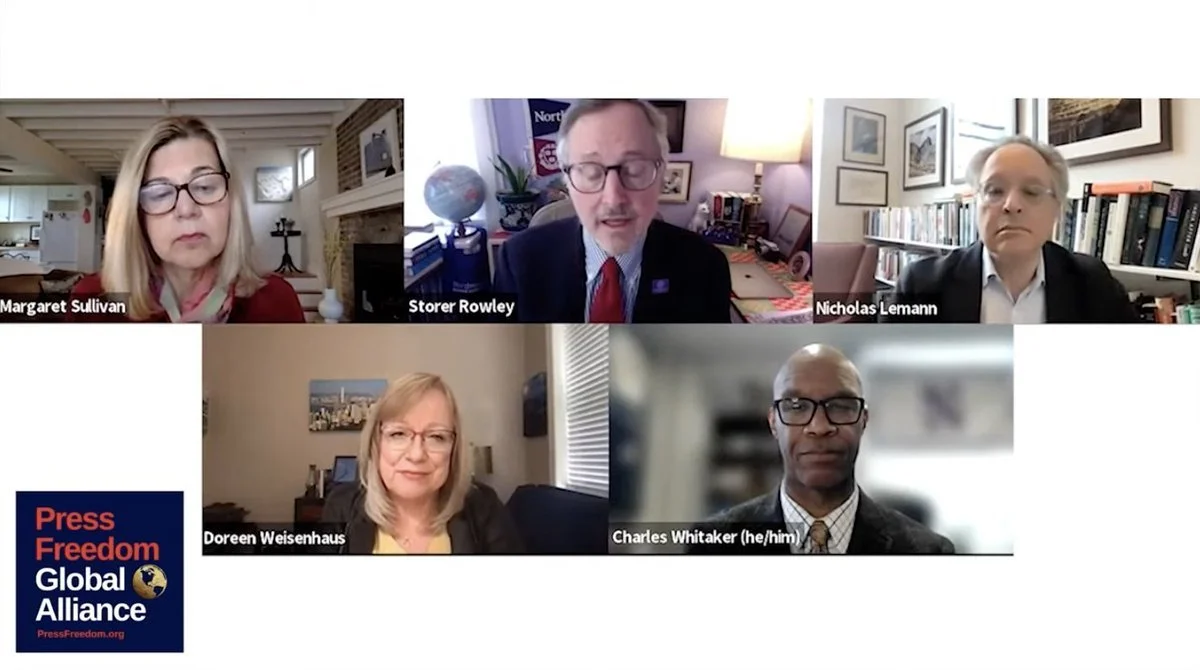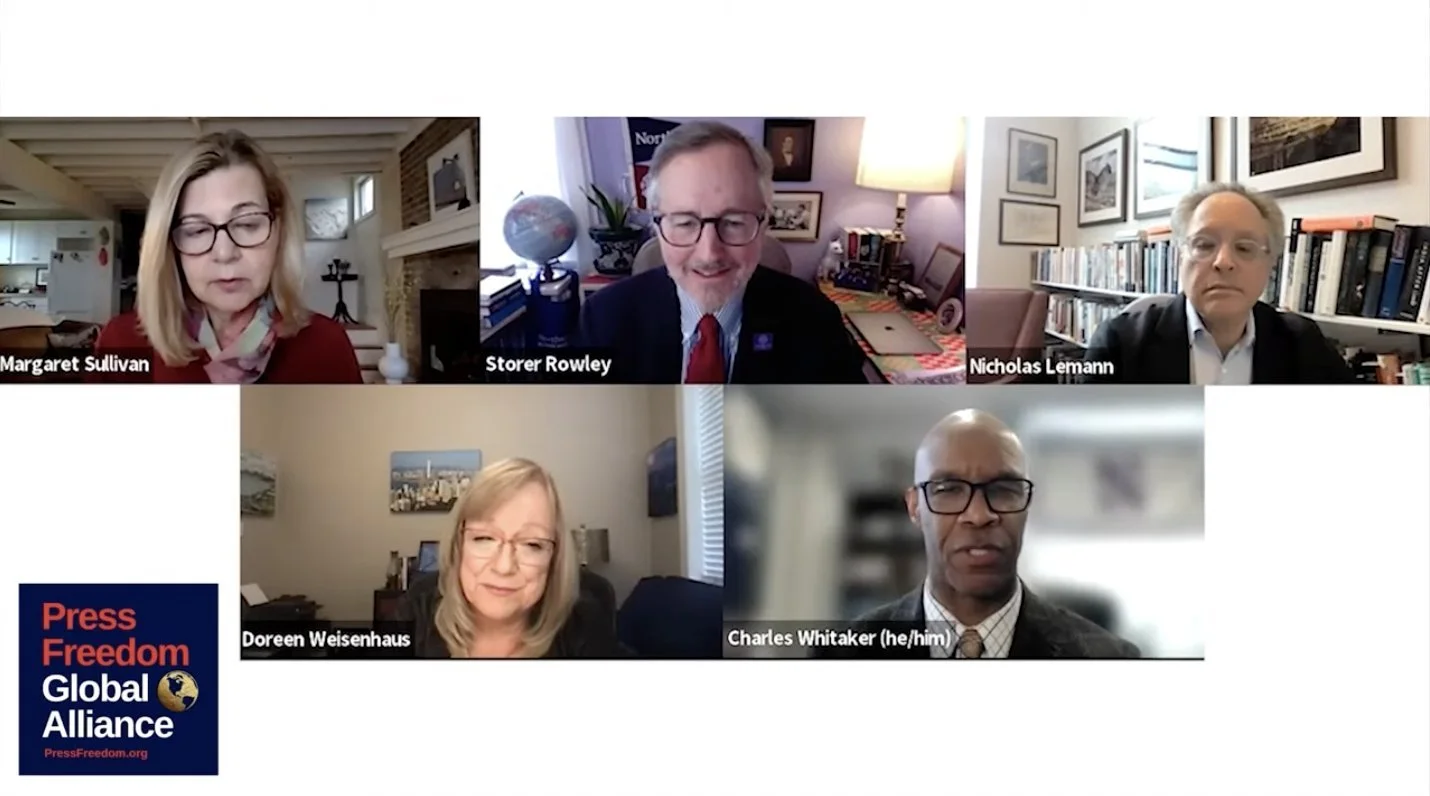Key Takeaways: Press Freedom Forum 2022 from World Trade Center
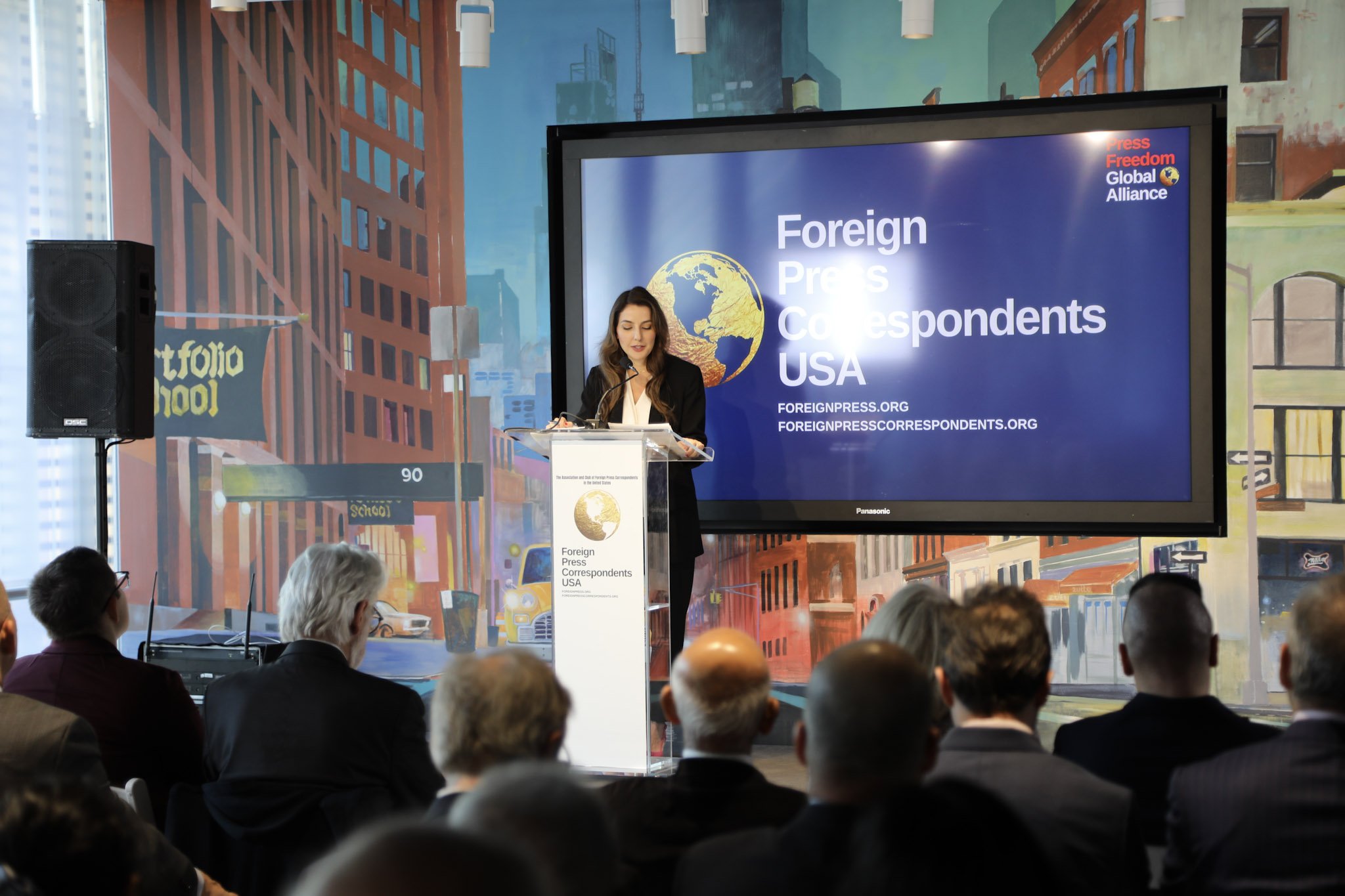
Journalists, partners, supporters, and media professionals came together for World Press Freedom Day in a ceremony hosted by the Association and Club of Foreign Press Correspondents USA at 7 World Trade Center in New York City. The Press Freedom Forum was presented and moderated by Vice President of the Association and Club of Foreign Press Correspondent, Susan M. Tehrani.
Susan Tehrani | Credits for all photos taken during Press Freedom Forum: Andrea DAndrea
The Association honored Jere Van Dyk, Zahra Joya, and Richard Gingras with Foreign Press 2022 Awards for their outstanding work in the field of truth-seeking, news curation, and storytelling. Speakers celebrated the occasion and sent sobering reminders that journalism and the truth are under attack all over the world.
“In this perilous time the words ‘freedom of the press’ are no longer an absolute; they have become malleable at best and an oxymoron at worst,” Nancy Prager-Kamel, Chairwoman of the Association & Club of Foreign Press Correspondents USA, said at the in-person ceremony of the Press Freedom Forum.
In an opening speech to the ceremony, Prager-Kamel spoke about the urgency of protecting press freedom and what a free press means to society. Her address rang out a clarion call to action for governments to hold accountable those who pose threats to journalists, their safety, and the truth.
George Svigos
Partners spoke in support of these values, called for more press advocacy and shared words of encouragement and solidarity.
“As we’ve all seen in the events over recent weeks and months, in particular, this idea, this flame of press freedom has never been more important,” said George Svigos, Executive Director of Communications for General Motors International. “As the saying goes, the first casualty in war is truth, and people in this room and your colleagues around the world play such a critical role in ensuring that the truth actually does get out there.”
Executive Director of the Association of Foreign Press Correspondents in the USA, Thanos Dimadis took the podium to speak not on the importance of the roles of journalists, in general, but instead to highlight a deeper issue impacting their business. “I, however, believe that there is one more important and urgent matter that we need as a society to address, and it is required to address it immediately, in terms of the freedom of press,” Dimadis said. “The issue is the controlled dissemination of misinformation and false news that feeds our society with polarization, division, and confusion on a daily basis.”
Thanos Dimadis
Dimadis added that the way in which audiences consume the news has changed and noted how shortened versions of news stories have bred impatience and inhibited critical thinking. He further emphasized the importance of journalists calling for press freedom within their own insular communities, rather than just reaching out to their audiences.
“This is where we have failed as journalists,” Dimadis said, expressing his concerns. “In my opinion journalists are trapped in a microcosm where they seek recognition, freedom, and respect, through a dialogue that occurs exclusively between themselves — between ourselves — but not with society.”
He posed a question to the audience: how do we make journalism fashionable again? Good journalism is at risk in the age of instant news and a waning support for the culture of print journalism. How do we keep interest and quality truth-seeking alive?
Thanos Dimadis
Dimadis proposed these solutions: more funding for local journalism and writers, and a reinvention of journalism by fostering a new generation of journalists who view the craft as a creator endeavor. Dimadis sees a future for journalism for those who can master the skills of creating journalism as a form of art, through better marketing, and by capitalizing on opportunities produced by technologization.
“Freedom of press does not only mean protecting journalists from danger, censorship, and vindictive treatment by authoritarian regimes. The biggest threat, in my view, that press freedom today is facing comes from journalists themselves who are unable to convince the world that their role and work evolves at the same rate our society evolves,” Dimadis said in closing.
Foreign Press Awardees 2022
Jere Van Dyk, a journalist for more than 40 years and an expert on Pakistan, Afghanistan, and the Middle East, was honored with the Foreign Press 2022 Award at the ceremony. In 2008, Van Dyk was captured by the Taliban and held captive for 45 days. His book covering the ordeal, entitled Captive: My Time as a Prisoner of the Taliban, was selected as one of Foreign Affairs’ Must-Read Books for the World Ahead.
“The most important part of press freedom is that which is within you. It’s the ability to stand up for what you think is right, the ability to say what you know is the truth, the ability to speak truth to power,” Van Dyk said in his acceptance speech.
Afghan journalist and Foreign Press 2022 awardee Zahra Joya was 5 years old when the Taliban took power in Afghanistan. Joya was the first girl from her village to attend university and studied law. She began her career in journalism in 2011 and created her own platform amplifying women’s voices, Rukhshana, in 2020. Joya was named one of Time magazine’s Women of the Year in 2022 for her work covering women’s lives in Afghanistan. In her video acceptance speech, Joya called attention to the Taliban’s oppression of women and girls in Afghanistan and reflected on the loss of freedom of journalists and women across Afghanistan.
“Today, my colleagues at Rukshana as well as my journalist friends at other outlets in Afghanistan are working in extremely difficult conditions. Women journalists are particularly at risk. They are disappearing from the Afghan media landscape simply because they are women.”
Joya closed out her remarks with a reminder to all that freedom of the press in Afghanistan continues to be under serious threat and pleaded for the world not to forget about her country.
“We do not do simply journalism these days, we are also covering the loss of our own rights, our own freedoms, and it is really painful,” she said.
Richard Gingras, Vice President at Google for News, received the third Foreign Press 2022 Award. In his role at Google News, Gingras works to ensure a diverse press, elevate quality journalism, and foster a healthy ecosystem for journalism online. He helped found Salon.com and serves on the boards of the First Amendment Coalition, the International Center for Journalists, and the International Consortium of Investigative Journalists.
“We must also recognize the battle for the role of journalism is ever more complex and challenging. We need more self reflection on how journalism works in our digital age, and we need to look more closely at the emergence of public policy around the world,” Gingras said in his enlightening speech.
Gingras spoke on his views of internet regulation, the importance of engaging with one's audience, the dizzying effects of online media, and how the freedoms enabled by the open internet can uplift journalism while also posing major threats to the craft as a whole.
“I am optimistic — though it’s hard to be these days. There are impassioned journalists, editors, entrepreneurs, technologists, focusing on these questions, but we need more of them–and we need them quickly,” Gingras said.
Q&A Highlights
Journalists must build bridges, be with and among the people, and convince their audiences that their interests are also theirs and give them information to help them come to their own conclusions.
Van Dyk has observed a harsh reality in media: the profession has been extremely favorable and at times exclusive toward white journalists. “It’s very hard, but I think that it is changing. It is getting better, but it’s going slowly. And it's probably even harder for a woman than a man,” Van Dyk said. Gingras added that diverse perspectives are key to servicing a community.
Digital Letters From Around the World
Messages of support, solidarity, and press advocacy came in from a global community celebrating this World Press Freedom Day.
Daniel Faitaua, President of the Foreign Press Association of London, marked the importance and continued relevance of Press Freedom Day, speaking from the longest-standing association for international correspondents in the world. With reference to his own recent experiences inside and around Ukraine, Faitaua shared messages of reverence and remembrance for colleagues risking and giving their lives to give voices to the voiceless.
“Information is power. Without facts we can’t get to the truth, without truth we lose trust — and most importantly we lose freedom,” Faitaua said from London. “I passionately believe that journalism makes democracy stronger and we need everyone to stand united for our right to do our job unfettered and uncensored this World Press Freedom Day.”
Helen Hoehne, President of the Hollywood Foreign Press Association, spoke on the challenges facing entertainment journalism and journalists as a whole. Hoehne discussed shrinking employment rates, below average salaries, and other elements affecting press freedom.
“Our fellow journalists are keeping the fire alive for all of us who choose a profession that involves keyboards, video cameras, notepads, and pencils,” Hoehne said. “The threats to our profession are not only bombs and bullets but also changed economic conditions and the growth of social media that has created so much good in terms of keeping the world looped in, but also great chaos with disinformation and false rumors.”
She continued to express the importance of keeping all forms of journalism alive, whether it be domestic reporting or coverage of an international conflict.
“As the first on-the-scene chroniclers of history our stories are the imprint by which future historians and generations build their history lessons,” she said.
Guilherme Canela De Souza Godoi, Chief of UNESCO’s Freedom of Expression and Safety of Journalists department, spoke about the digital and physical threats facing journalists but also the progress that freedom of the press has made all around the world.
“World Press Freedom Day is a tribute to all of you. It is a recognition by the peoples of the world that what you do, the risks you take, matter. [Journalism is] the key to enhancing our democratic values, to protect and promote human rights, to foster inclusive and sustainable development,” De Souza Godoi said. “Thank you for your courage, thank you for demonstrating that information saves lives, and that journalism is indeed a public good.”
Ernest Sagaga, Head of Human Rights and Safety at the International Federation of Journalists (IFJ), described growing concerns – backed by reports published by the Council of Europe, and partner organizations including the IFJ – over the declining state of press freedom in Europe. The report shows that from 2020 to 2021 there was a 41 percent increase in alerts which range from online abuse to criminal detention and restrictive legislation.
“It is true to say that journalism is under threat all over the world,” Sagaga said, speaking from the Brussels Press Club. “We’re not only talking about countries at war or what you call ‘third states', we are also talking about countries where there is supposed to be a liberal democracy rule of law.”
Clayton Weimers, Deputy Director of Reporter Without Borders (RSF), spoke about the attacks facing journalists today and ways in which the RSF supports press freedom by providing resources for journalists and working to bring more protection to journalists worldwide.
“Far too often, the killers, kidnappers, or jailers of reporters are able to act with impunity,” Weimers said in reference to the killing of journalists in Mexico and the murder of Jamal Khashoggi. “Allowing a culture of impunity to persist when it comes to crimes against journalists only encourages more of the same.
Vicent Partal, Chair of the European Journalism Centre, spoke on the threats toward press freedom and the necessity of asking what we can do as individuals to further preserve our rights.
“Our organization based in Maastricht in the Netherlands works all over Europe, trying to help people to improve the quality of journalism on our continent, defending press freedom, and helping all of us to adapt to the new environment where we are living,” he said. “Because of that, I am happy to salute you in this event organized by the Association of Foreign Press Correspondents in the USA on Press Freedom Day.”
Irving Washington, Executive Director and CEO of the Online News Association, sent a message of solidarity in honor of Press Freedom Day and recognized the essential work that has been done by journalists to keep governments in check and people informed.
“Journalism and journalists are vital to democracies under threats,” Washington said. “Whether that's telling the heartbreaking stories of war, holding the evermore powerful government accountable, or challenging the structural inequities that we face across the world — it’s vital that we have a free press.”
Ayesha Tanzeem, Director of the South and Central Asia Division at the Voice of America, spoke about her time reporting from Afghanistan and the threats journalists face under Taliban rule, the influence of fear in journalists’ lives, the issues facing media in Asia, and disinformation campaigns worldwide.
“In south and central Asia, when there was no free media, it was simpler – the audience knew. Now, in many countries, there’s a facade of free media, truth does not matter,” Tanzeem said.
Kevin Goldberg, First Amendment Specialist at the Freedom Forum and member of the Board of Directors at the National Press Foundation, reflected on Press Freedom Day as someone who has traveled to more than 15 countries around the world to advocate for press freedom.
“I know that a free press remains crucial to the fate of democracy and human rights around the world,” Goldberg said.
Mentioning the Freedom Forum’s 2021 survey of more than 3,000 Americans–which showed that while Americans felt strongly about the preservation of the First Amendment, only 14 percent trusted journalists–Goldberg expressed his concerns for freedom of the press within the U.S. and the importance of preserving press freedom for everyone everywhere.
“We can communicate instantly with each other across boundaries and across thousands of miles. There is no evading the fact that we are all connected, that we all share the same goals and therefore should all strive to share the same goal of the free flow of information as well,” he said. “That is why World Press Freedom Day remains so vital.”
Mitzi Perdue, former journalist, author, and anti-trafficking advocate, sent her greetings as a sponsor of the Association’s Press Freedom Day event and shared her thoughts on the importance of journalism.
“I think it’s almost impossible to express how important – at least I feel – that the profession of journalism is,” Perdue said. “Your work makes democracy possible.”
Press Freedom Forum: Global Threats, Disinformation, and the Future of Press Freedom
Distinguished and accomplished journalists and media professionals joined the Association for World Press Freedom Day to discuss the increasingly hostile environments independent journalists face around the world, underscoring the value they bring in seeking the truth and doing fact-based, objective reporting.
Charles Whitaker
Charles Whitaker is dean and professor at Northwestern University’s Medill School of Journalism, Media, Integrated Marketing Communications and has taught courses there since 1992 in news writing, magazine writing and editing, and blogging. Throughout his career, he has worked for newspapers such as the Miami Herald and the Louisville Times. He has also contributed to the Chicago Tribune, The Saturday Evening Post, Essence Magazine, and the Philadelphia Inquirer. Whitaker also co-authored the textbook “Magazine Writing” and served as the co-director for Project Masthead, a program that encourages students of color to consider careers in the magazine industry. Before teaching at Medill, Whitaker was a senior editor at Ebony magazine.
Nicholas Lemann
Nicholas Lemann is the Joseph Pulitzer II and Edith Pulitzer Moore Professor of Journalism; Dean Emeritus; and Director, Columbia World Projects at Columbia Journalism School in New York City. He began his journalism career at age 17 and has worked at the Washington Monthly, The Washington Post as a member of the national staff, The Atlantic Monthly as a national correspondent, and at The New Yorker as a staff writer and then Washington correspondent. He has written for The New York Times, Slate, and The New York Review of Books and has authored several books including “Transaction Man: The Rise of the Deal and the Decline of the American Dream” and “The Big Test: The Secret History of the American Meritocracy.” Lemann continues to contribute to The New Yorker, and currently serves on the boards of the Authors Guild, the Knight First Amendment Institute, the Thomson Reuters Founders Share Company, and the Russell Sage Foundation.
Margaret Sullivan
Margaret Sullivan is the Media Columnist for The Washington Post and was the recipient of the 2020 Mirror Award for her piece on the media coverage of Donald Trump’s first impeachment. She previously served as the first woman Public Editor for The New York Times and earlier as the first female managing editor and then editor of the Buffalo News. Sullivan was a member of the Pulitzer Prize board from 2011 to 2012, and she was twice elected as a director of the American Society of Newspaper Editors, where she led the First Amendment Committee. Sullivan’s first book “Ghosting the News: Local Journalism and the Crisis of American Democracy” was an NPR and Washington Post best book of 2020. Her memoir “Newsroom Confidential” will be published this fall.
Doreen Weisenhaus
Doreen Weisenhaus is a Senior Lecturer and Director of the Media Law and Policy Initiative at the Medill School of Journalism with a joint appointment at Northwestern’s Pritzker School of Law. She previously taught media law and ethics at the Journalism and Media Studies Centre at the University of Hong Kong, and she directed the Media Law Project, an educational resource for lawyers, scholars, journalists, and other media professionals. Her research covers international press freedom and global developments in media law and policy. Weisenhaus is the author of “Hong Kong Media Law: A Guide for Journalists and Professionals.” She has delivered academic presentations in countries including Nepal, Australia, Malaysia, China, South Africa, France, the UK, and more. Weisenhaus formerly served as the City Editor for The New York Times and was the first legal editor of The New York Times Magazine.
Storer Rowley
Storer H. “Bob” Rowley is an American foreign correspondent who has run bureaus in Mexico, Canada, and Israel, and covered stories in Europe, Africa, the Middle East, and beyond. Rowley reported for the Chicago Tribune for 30 years, covering foreign affairs, national stories and conflict, writing editorials, and managing national correspondents. In 1996, he was on a team of Tribune reporters selected as a finalist for a Pulitzer Prize for the paper’s series on why people around the world have children they can’t afford. He writes commentary for Washington Monthly and The Tribune, and his work has also appeared in the Boston Globe, the Baltimore Sun, and the Huffington Post. Rowley now teaches journalism at the Medill School of Journalism and is a member of the boards of the Association of Foreign Press Correspondents in the USA, the Chicago Headline Club Foundation, and the Master of Science in Communication Alumni Association.
Urgent Concerns on the Present and Future of Press Freedom
Speakers on the Press Freedom Panel outlined threats facing reporters covering Russia’s war in Ukraine, raised urgent concerns about the current state of press freedom around the world, including in the U.S., and offered remedies as journalists and educators on what is necessary for press freedom to survive in the future.
“What disturbs and upsets me the most about this moment in time is the global assault on truth and how indifferent, it seems, so many, but certainly domestically, are to that,” Whitaker said of his concerns for the future generation of journalists.
He emphasized that those who teach journalism have a special responsibility to remind the public of what it means to lose the press as watchdogs of governments, public figures, and those who hold power.
On the impacts to press freedom around the world, Lemann used the U.S and China as examples of societies that have rejected an expansion of press freedoms or have failed to live up to expectations to honor it.
“It’s become clear that a lot of the world, at least a lot of world leaders or holders of power, really don’t believe in press freedom as a good idea,” Lemann said. “To the extent that press freedom goes with democracy, democracy is in retreat around the world.”
Sullivan expressed her thoughts on press freedom through the lens of the Russian war in Ukraine. She commended the reporters who have been on the ground, reporting back what they can in perilous conditions in Ukraine, and she spoke on the dangers independent journalists have been facing while covering the war in Russia.
“It’s a very scary time, I think, to be a truth-teller about this war. You could die, you could be thrown into prison, or you could be poisoned if you tell the truth. Reporting has been criminalized,” Sullivan said, referring to Russian President Vladimir Putin’s new law banning any coverage deemed to be false by Kremlin standards.
Weisenhaus also emphasized these sentiments, adding that despite this recent attack on press freedom in Russia, it comes from a worrisome pattern with autocratic governments and a long history of “oppressive legal regimes.”
“Journalists from abroad who are setting up independent organizations, because over 600 websites of independent media in Russia have been shut down without a court order — without any other kind of intervention– they feel they can’t get whatever they come up with back to the people in Russia who are under great restrictions of where they can access their news, and there's a very well organized, well paid, propaganda information regime in which they get their information,” Weisenhaus said on how Russian censorship has impacted both local and foreign journalists’ reporting.
Disinformation, Free Speech, and Freedom of the Press
Panelists agreed that media literacy is integral to the future and the fight against misinformation and disinformation. Whitaker believes journalists can combat disinformation through education and that readers should be armed early on with the tools to discern what is fact and what is fiction, because as long as there are people trying to spread false information, disinformation will persist.
One theme discussed was whether the proliferation of false and dangerous information on social media platforms should lead to more strict government controls and media regulations to be in place to combat disinformation, as former President Barack Obama, among others, has advocated.
“At some point, you can do everything possible to build up good reliable journalism; you can have a fact-checking sector online; you can have media literacy, and there still is not a perfect fit between a free speech ethic and a truth ethic,” Lemann said, noting that journalists tend to lump their First Amendment free press protections with freedom of speech rights in the same way.
While journalists tend to see them as the same thing, he said, the rise of social media in particular, and deregulated broadcast journalism to some extent, have shown there are differences between free speech and freedom of the press, and they are not the same thing. And that will lead to a difficult conversation about more government regulation, long mistrusted by a free press.
Lemann said this issue will be something journalists must grapple within the years ahead. “I think we’re going to be having a conversation about whether it’s possible for us journalists to be totally dedicated advocates of a free press and of free speech, knowing that that means there will be way more misinformation and lies than good information. Are we comfortable with that? And if we’re not, are we willing to explore alternatives which are things which would make us naturally uncomfortable?”
Preserving Press Freedom and Combatting “Alternative Truths”: What Can We Do?
Personal protection. Weisenhaus recommends that journalists looking to cover areas of conflict in this current state of threats against the freedom of the press not only protect themselves against physical harm but prepare legal defenses as well, learning what is permitted and prohibited by certain governments. She also recommended young journalists protect themselves with digital security measures.
Local News. Sullivan spoke on how declines in local news and the persistence of news deserts have meant a loss of consensus in communities. Instead of having the commonly agreed upon set of facts, or truth, people are now relying on online echo chambers to confirm their beliefs.
More education, less entertainment. Whitaker spoke on the importance of distinguishing the difference between free speech and freedom of the press and addressed the media’s role in creating distrust through the pursuit of clicks and high-performing pieces. He explained that through commercializing the news for better business, the media has deprived people of education and has instead provided more entertainment.
Better funding systems should be considered. While Lemann is wary of media reliance on advertisers or rich owners for funding, he believes that journalists shouldn’t fully discount government funding. The reason, he said, is because there are examples in which research at universities and some subsidized media outlets have been able to maintain independence while being partly funded by government sources, which deliver grants within the confines of reasonable checks and balances on the government’s power to dictate content or control.
Watch the Press Freedom Forum on-demand on Youtube.
Kate Nakamura is a news associate of the Foreign Press. She was born and raised in Honolulu, Hawaii, and moved to New York City to study journalism at Hunter College. She graduated in 2020 with a Bachelor's degree in Media Studies, focusing primarily on documentary filmmaking and multimedia journalism. Her primary focus in journalism is writing and reporting on minority issues in the United States.


